An Unsolved Theoretical Problem
Thumbnail
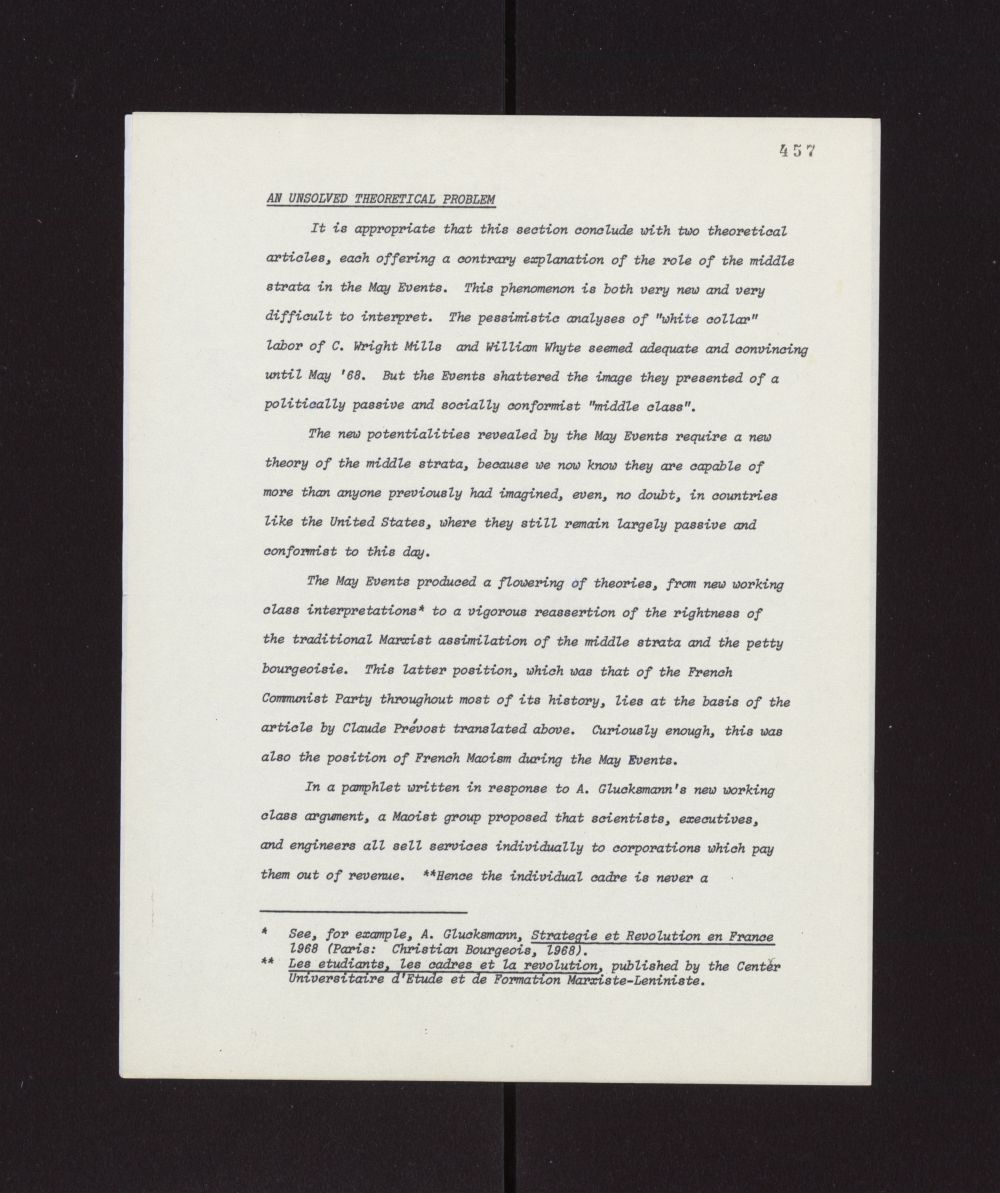

ft ft
tJ «
AS
It is appropriate that this section with theoretical
articles^ each offering a explanation of role of the middle
strata in the Events. This phenomenon is both very very
difficult to interpret. The analyses of "white collar"
labor of C, Wright Mills and William Vhyte adequate and convincing
until '68. But the shattered the of a
politically passive and socially conformist "middle class".
The potentialities revealed "by the Events require a
theory of the middle stratat we know they capable of
theory of the middle stratat we know they capable of
more than anyone previously had, imaffined^ even, no doubtf in countries
like the United Statest they still largely passive and
like the United Statest they still largely passive and
conformist to this day.
The Events produced a flowering of theories* from working
class interpretations* to a vigorous reassertion of the Tightness of
the traditional Marxist assimilation of the middle strata and the petty
bourgeoisie. This latter position, which that of the French
Conmunist Party throughout most of its historyt lies at the basis of the
article by Claude Prevost translated above. Curiously enough^ this
also the position of French during the Events.
class interpretations* to a vigorous reassertion of the Tightness of
the traditional Marxist assimilation of the middle strata and the petty
bourgeoisie. This latter position, which that of the French
Conmunist Party throughout most of its historyt lies at the basis of the
article by Claude Prevost translated above. Curiously enough^ this
also the position of French during the Events.
In a pamphlet written in response to A. Gluakemann's working
class argument, a Maoist group proposed that scientists^ executives*
and engineers all sell services individually to corporations which
them out of revenue. **Hence the individual is never a
class argument, a Maoist group proposed that scientists^ executives*
and engineers all sell services individually to corporations which
them out of revenue. **Hence the individual is never a
* See, for example, A. Gluakmannt Strategie_^t_ Resolution en Prance
1968 (Paris: Christian Bourgeoisf 1968),
** |g£......etudiant8A_ lescadres et^^ revolution^ published by the Center
** |g£......etudiant8A_ lescadres et^^ revolution^ published by the Center
Unwers^fatre a'Etude et de Formation te-Leniniste.
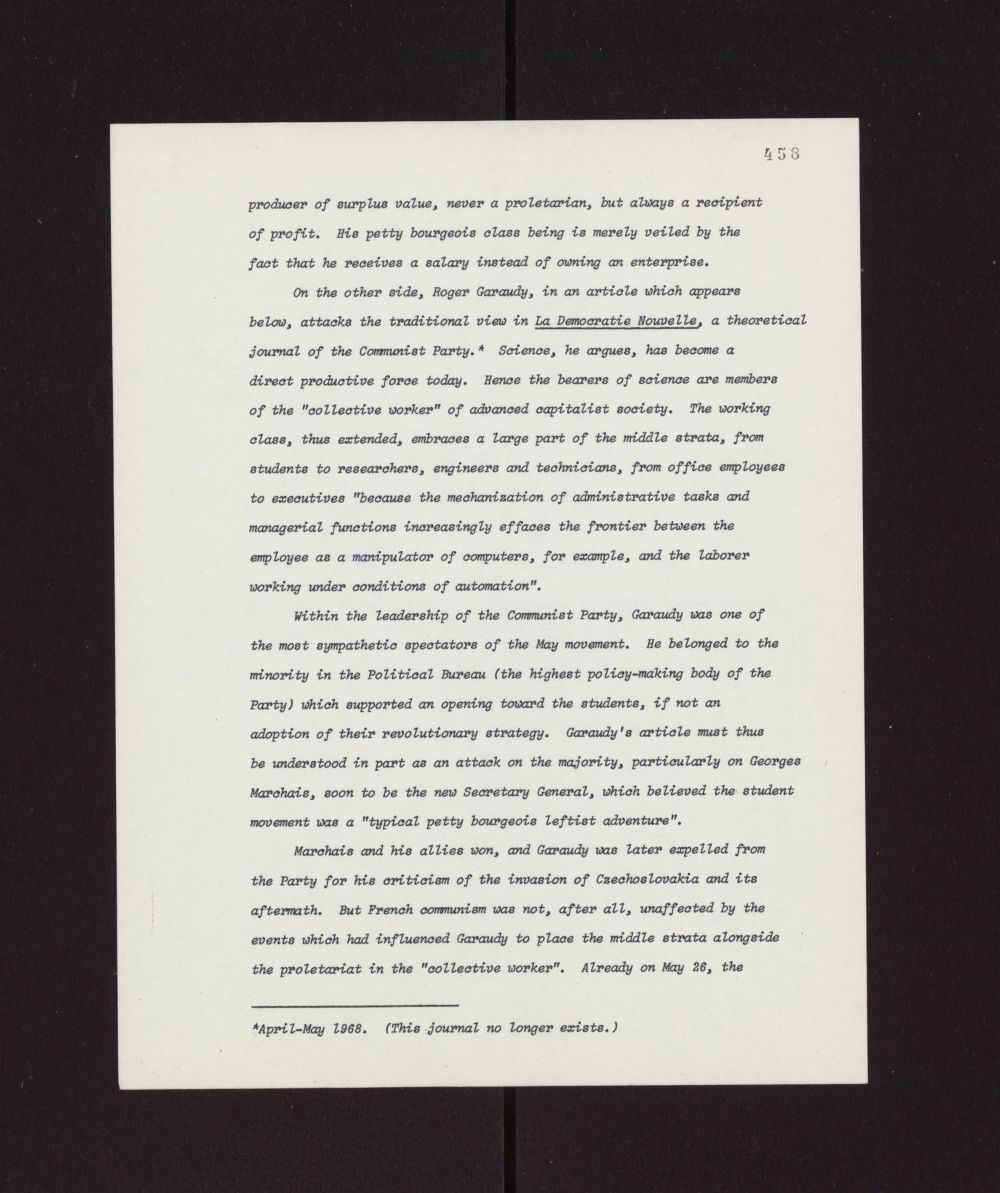

45G
producer of surplus valuef a proletarian^ but always a recipient
of profit. His petty "bourgeois class being is merely veiled by
foot that "he receives a salary instead of owning an enterprise.
of profit. His petty "bourgeois class being is merely veiled by
foot that "he receives a salary instead of owning an enterprise.
On the other side, Roger Garaudyt in an article which appears
belowt attacks the traditional view in La __D0noaratie^ Souvellef a theoretical
journal of the Communist Party, * Science,, he argues, a
direct productive force today. Hence the bearers of science are
of the "collective worker" of advanced capitalist society. The working
alasSf thus extended, a large part of the middle strata* from
students to researchers^ engineers and technicians^ from office employees
to executives "because the mechanization of administrative and
managerial functions increasingly effaces the frontier between the
employee as a manipulator of computers^ for examplet and the laborer
working under conditions of automation".
belowt attacks the traditional view in La __D0noaratie^ Souvellef a theoretical
journal of the Communist Party, * Science,, he argues, a
direct productive force today. Hence the bearers of science are
of the "collective worker" of advanced capitalist society. The working
alasSf thus extended, a large part of the middle strata* from
students to researchers^ engineers and technicians^ from office employees
to executives "because the mechanization of administrative and
managerial functions increasingly effaces the frontier between the
employee as a manipulator of computers^ for examplet and the laborer
working under conditions of automation".
Within the leadership of the Communist Party, Garaudy was one of
the most sympathetic spectators of the movement. He belonged to the
minority in the Political Bureau (the highest policy-making body of the
Party) which supported an opening toward the students, if not an
adoption of their revolutionary strategy. Garaudy's article must thus
be understood in part as an attack on the majorityt particularly on
MarohaiSf soon to be the Secretary General, which believed the student
movement a "typical petty bourgeois leftist adventure".
the most sympathetic spectators of the movement. He belonged to the
minority in the Political Bureau (the highest policy-making body of the
Party) which supported an opening toward the students, if not an
adoption of their revolutionary strategy. Garaudy's article must thus
be understood in part as an attack on the majorityt particularly on
MarohaiSf soon to be the Secretary General, which believed the student
movement a "typical petty bourgeois leftist adventure".
Marchaie and his allies won3 and Garaudy later expelled from
the Party for his criticism of the invasion of Czechoslovakia and its
aftermath. But French communism notf after all, unaffected by the
events which had influenced Garaudy to place the middle strata alongside
the proletariat in the "collective worker". Already on 261 the
the Party for his criticism of the invasion of Czechoslovakia and its
aftermath. But French communism notf after all, unaffected by the
events which had influenced Garaudy to place the middle strata alongside
the proletariat in the "collective worker". Already on 261 the
*April~May 1988. (This journal no longer exists.)
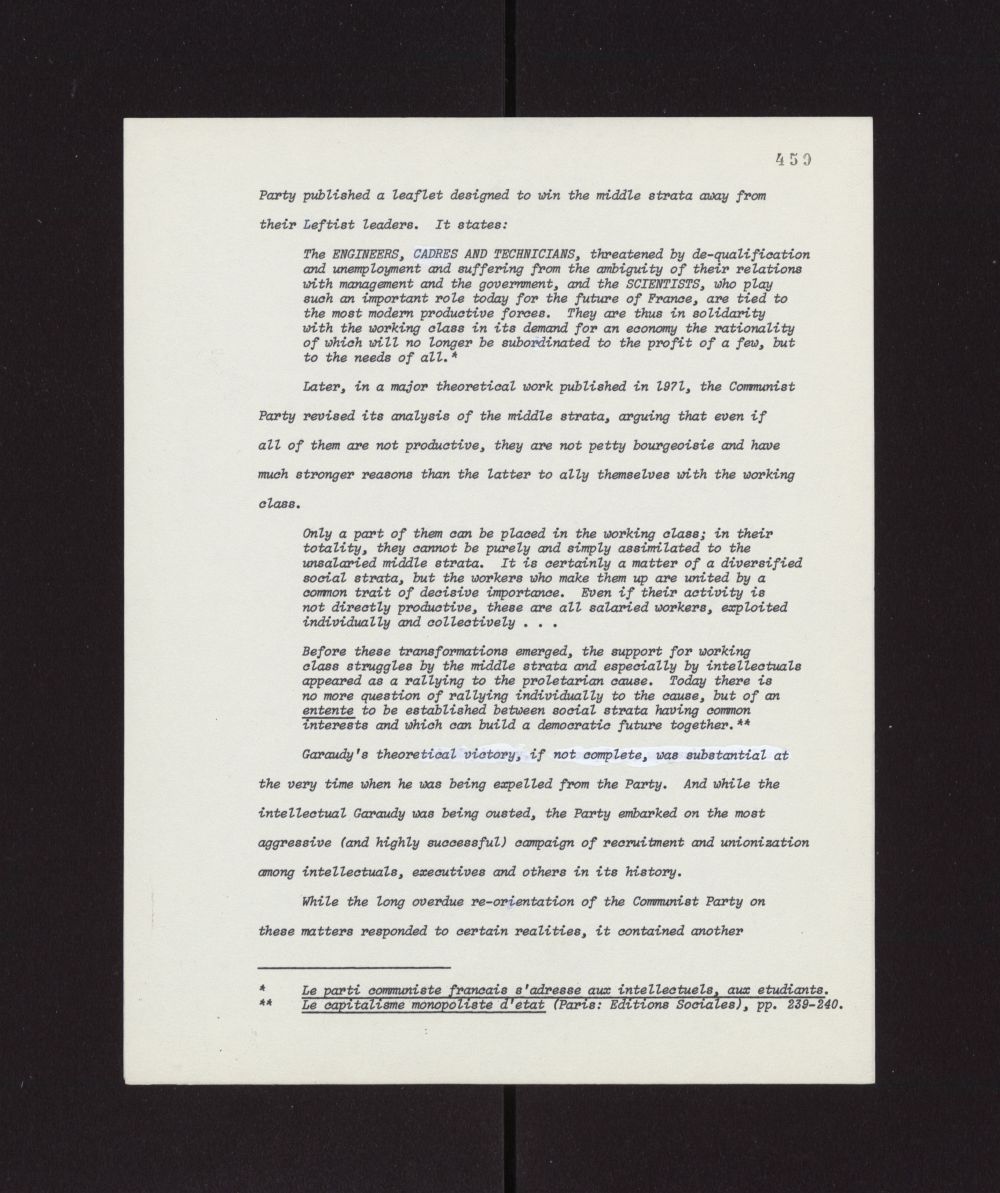

4
Party published a leaflet to win the middle from
their Leftist leaders. It states:
their Leftist leaders. It states:
The AMD threatened by de-qualification
and unemployment suffering from the ambiguity of their relations
with management and goverrment, the SCIENTISTS, who play
with management and goverrment, the SCIENTISTS, who play
an important role today for the future of France,, tied to
the most modem productive forces. They are thus in solidarity
with the working Glass in its for an the rationality
of which will no longer be subordinated to the profit of a few, but
to the needs of all. *
the most modem productive forces. They are thus in solidarity
with the working Glass in its for an the rationality
of which will no longer be subordinated to the profit of a few, but
to the needs of all. *
Later, in a major theoretical work published in 1971, the Communist
Party revised its analysis of the middle strata, arguing that even if
all of them are not productive, they are not petty bourgeoisie and
much stronger than the latter to ally themselves with the working
close,
Party revised its analysis of the middle strata, arguing that even if
all of them are not productive, they are not petty bourgeoisie and
much stronger than the latter to ally themselves with the working
close,
Only a part of them can be placed in the working class; in their
totality,, they cannot be purely and simply assimilated to the
unsalaried middle strata. It is certainly a matter of a diversified
social strata, but the workers who make them up united by a
common trait of decisive importance* Even if their activity is
not directly productive, these are all salaried workers, exploited
individually and collectively . , .
totality,, they cannot be purely and simply assimilated to the
unsalaried middle strata. It is certainly a matter of a diversified
social strata, but the workers who make them up united by a
common trait of decisive importance* Even if their activity is
not directly productive, these are all salaried workers, exploited
individually and collectively . , .
Before these transformations emerged, the support for working
close struggles by the middle strata and especially by intellectuals
appeared as a rallying to the proletarian cause. Today there is
no more question of rallying individually to the cause, but of an
entente to be established between social strata having common
interests and which build a democratic future together, **
appeared as a rallying to the proletarian cause. Today there is
no more question of rallying individually to the cause, but of an
entente to be established between social strata having common
interests and which build a democratic future together, **
Garaudy's theoretical if not complete, substantial at
the very time when he being expelled from the Party. And while the
intellectual Garaudy being ousted, the Party on the most
aggressive (and highly successful) aaanpaign of recruitment and unionization
among intellectuals, executives and others in its history.
the very time when he being expelled from the Party. And while the
intellectual Garaudy being ousted, the Party on the most
aggressive (and highly successful) aaanpaign of recruitment and unionization
among intellectuals, executives and others in its history.
While the long overdue re-orientation of the Communist Party on
these matters responded to certain realities, it contained another
these matters responded to certain realities, it contained another
4
4*
Le parti ocmmafa aux_etudiante
Le" .....^ '*
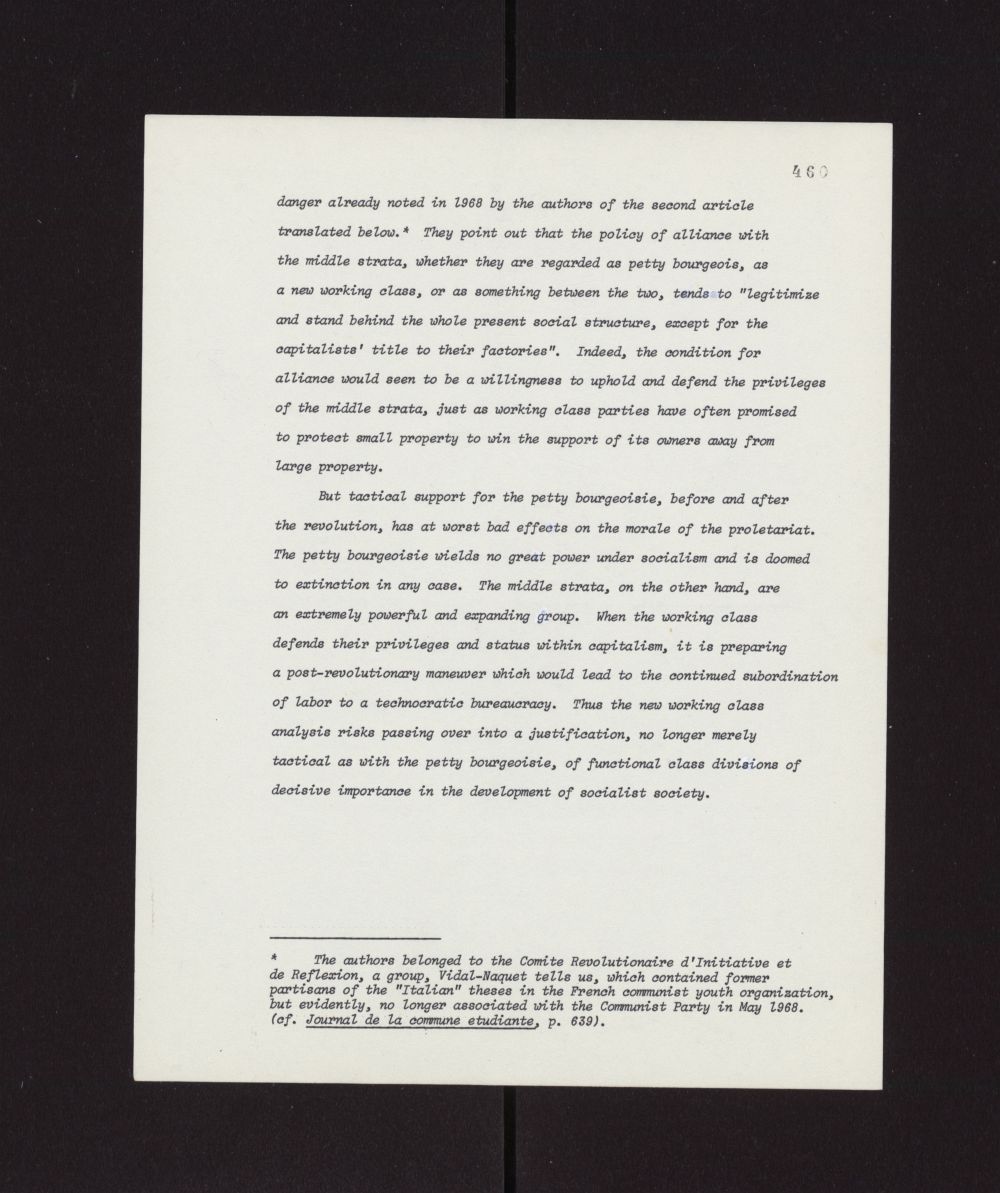

already noted in 1988 by authors of the article
translated belau, * They point out that the policy of alliance with
the middle strata, whether they regarded as petty bourgeois, as
a working class, or as something too, to "legitimize
translated belau, * They point out that the policy of alliance with
the middle strata, whether they regarded as petty bourgeois, as
a working class, or as something too, to "legitimize
and stand behind the whole present social structure, for the
capitalists' title to their factories". Indeed, the condition for
alliance would seen to be a willingness to uphold and defend the privileges
of the middle strata, just as working class parties have often promised
to protect small property to win the support of its from
large property.
capitalists' title to their factories". Indeed, the condition for
alliance would seen to be a willingness to uphold and defend the privileges
of the middle strata, just as working class parties have often promised
to protect small property to win the support of its from
large property.
But tactical support for the petty bourgeoisie, before and after
the revolution, has at worst bad effects on the morale of the proletariat.
The petty bourgeoisie wields no power under socialism and is doomed
to extinction in any case. The middle strata, on the other hand,
an extremely powerful and expanding group. I/hen the working class
defends their privileges and status within capitalism, it is preparing
a post-revolutionary maneuver which would lead to the continued subordination
of labor to a technocratic bureaucracy* Thus the working class
analysis risks passing over into a justification, no longer merely
tactical as with the petty bourgeoisie, of functional class divisions of
decisive importance in development of socialist society.
the revolution, has at worst bad effects on the morale of the proletariat.
The petty bourgeoisie wields no power under socialism and is doomed
to extinction in any case. The middle strata, on the other hand,
an extremely powerful and expanding group. I/hen the working class
defends their privileges and status within capitalism, it is preparing
a post-revolutionary maneuver which would lead to the continued subordination
of labor to a technocratic bureaucracy* Thus the working class
analysis risks passing over into a justification, no longer merely
tactical as with the petty bourgeoisie, of functional class divisions of
decisive importance in development of socialist society.
* The authors belonged to the Conrite Revolutionaire dfInitiative et
de B.efLeseion, a group, Vidal-Waquet tells us, which contained former
partisans of the "Italian" in the French youth organization,
but evidently, no longer associated with the Conmuniet Party in 1988*
(of. Journalde la etudiante, p. €39),
de B.efLeseion, a group, Vidal-Waquet tells us, which contained former
partisans of the "Italian" in the French youth organization,
but evidently, no longer associated with the Conmuniet Party in 1988*
(of. Journalde la etudiante, p. €39),
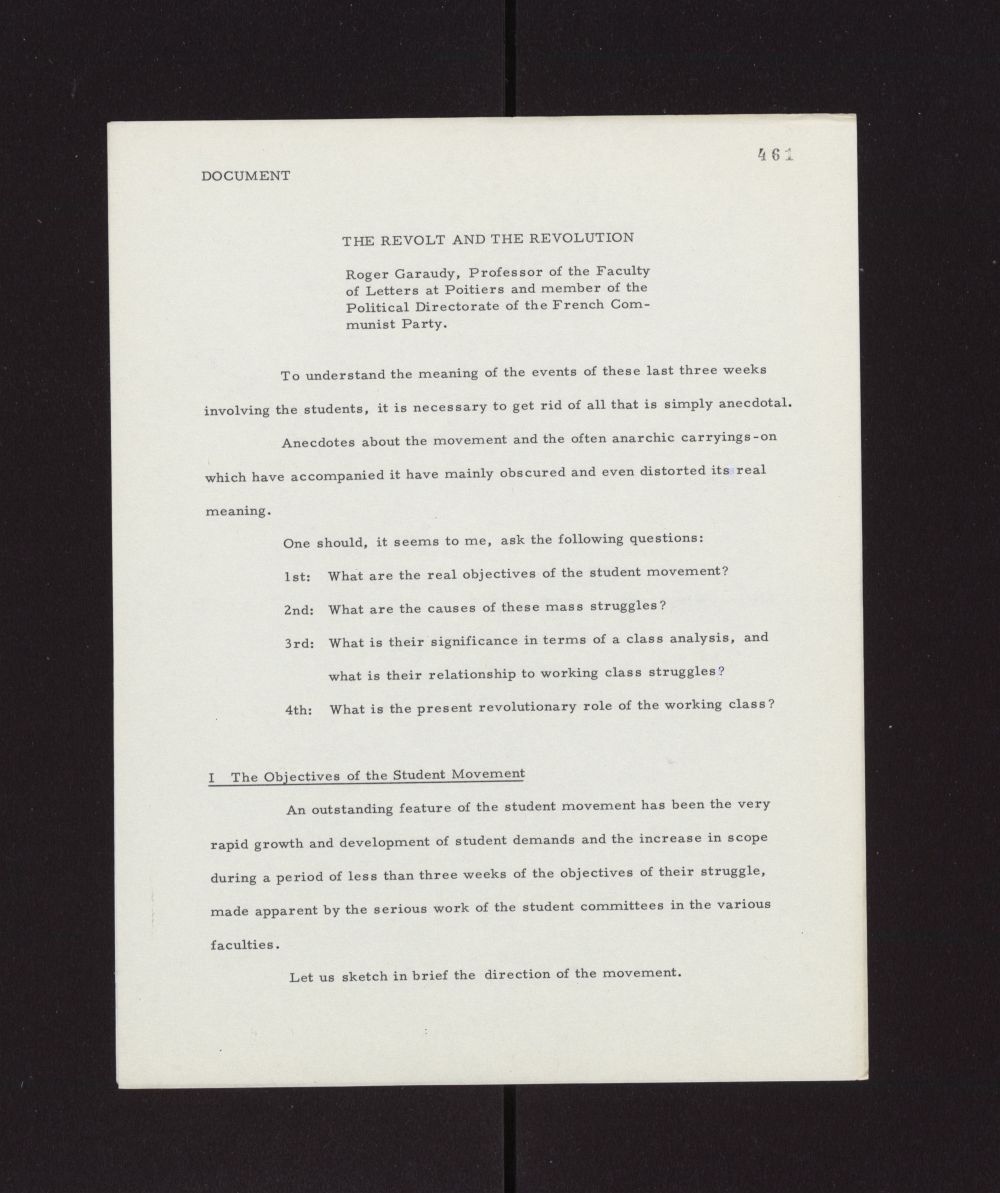

DOCUMENT
THE REVOLT AND THE REVOLUTION
Roger Garaudy, Professor of the Faculty
of Letters at Poitiers and member of the
Political Directorate of the French Com-
munist Party.
of Letters at Poitiers and member of the
Political Directorate of the French Com-
munist Party.
To understand the meaning of the events of these last three weeks
involving the students, it is necessary to get rid of all that is simply anecdotal.
involving the students, it is necessary to get rid of all that is simply anecdotal.
Anecdotes about the movement and the often anarchic carryings-on
which have accompanied it have mainly obscured and even distorted its real
meaning.
which have accompanied it have mainly obscured and even distorted its real
meaning.
One should, it seems to me, ask the following questions:
1st: What are the real objectives of the student movement?
2nd: What are the causes of these mass struggles?
3rd; What is their significance in terms of a class analysis, and
what is their relationship to working class struggles?
what is their relationship to working class struggles?
4th; What is the present revolutionary role of the working class?
An outstanding feature of the student movement has been the very
rapid, growth and development of student demands and the increase in scope
during a period of less than three weeks of the objectives of their struggle,
made apparent by the serious work of the student committees in the various
faculties.
rapid, growth and development of student demands and the increase in scope
during a period of less than three weeks of the objectives of their struggle,
made apparent by the serious work of the student committees in the various
faculties.
Let us sketch in brief the direction of the movement.
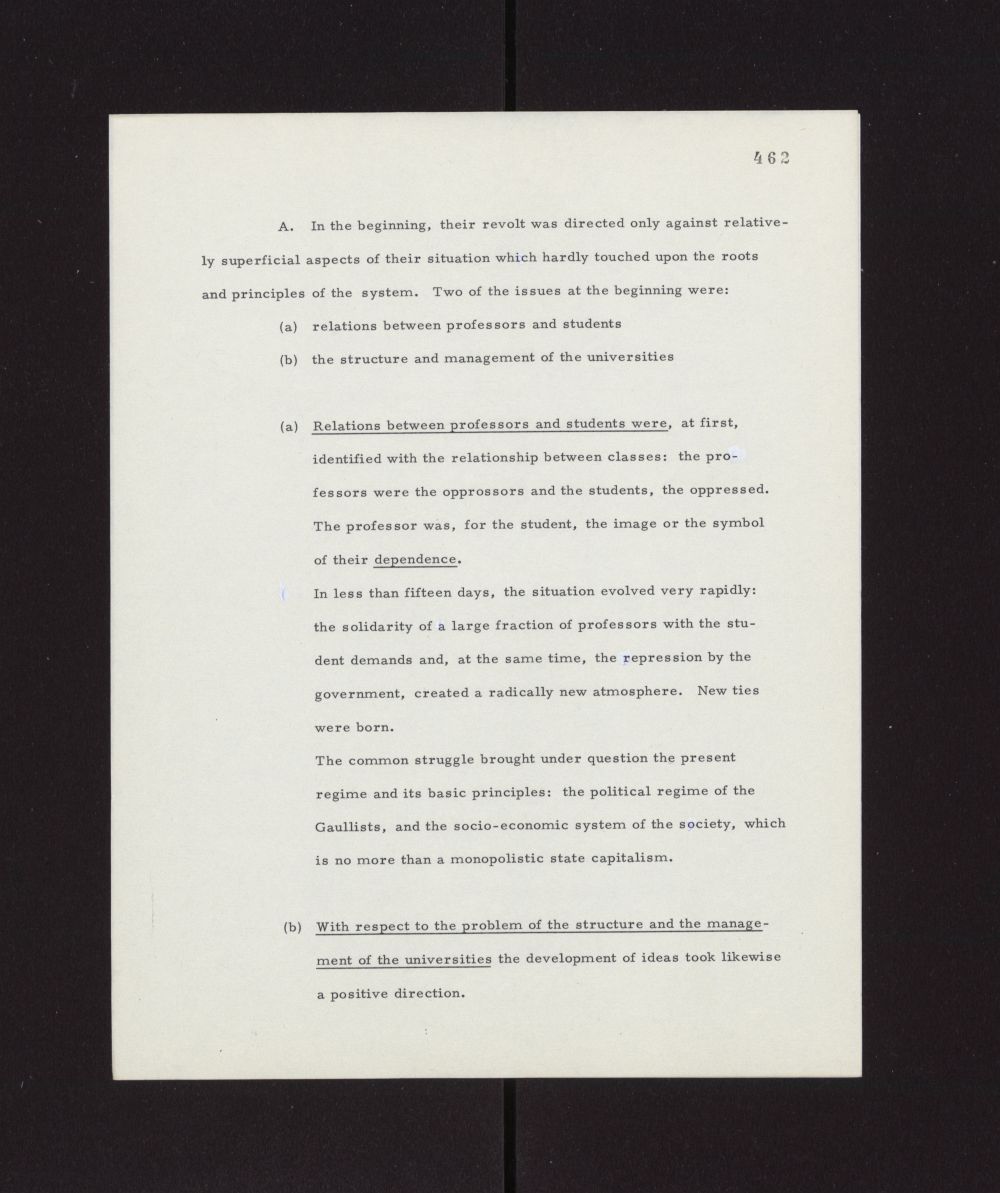

462
A, In the beginning, their revolt was directed only against relative-
ly superficial aspects of their situation which hardly touched upon the roots
and principles of the system. Two of the issues at the beginning were:
ly superficial aspects of their situation which hardly touched upon the roots
and principles of the system. Two of the issues at the beginning were:
(a) relations between professors and students
(b) the structure and management of the universities
(a) Relations b etween prof e sso r s and student s were, at first,
identified with the relationship between classes: the pro-
fessors 'were the oppressors and the students, the oppressed.
The professor was, for the student, the image or the symbol
of their clejj>ejadence_.
identified with the relationship between classes: the pro-
fessors 'were the oppressors and the students, the oppressed.
The professor was, for the student, the image or the symbol
of their clejj>ejadence_.
In less than fifteen days, the situation evolved very rapidly:
the solidarity of a large fraction of professors with the stu-
dent demands and, at the same time, the repression by the
government, created a radically new atmosphere. New ties
were born.
the solidarity of a large fraction of professors with the stu-
dent demands and, at the same time, the repression by the
government, created a radically new atmosphere. New ties
were born.
The common struggle brought under question the present
regime and its basic principles: the political regime of the
Gaullists, and the socio-economic system of the society, which
is no more than, a monopolistic state capitalism.
regime and its basic principles: the political regime of the
Gaullists, and the socio-economic system of the society, which
is no more than, a monopolistic state capitalism.
(b) With respect to the problem ^
and the
a positive direction.
the development of ideas took likewise
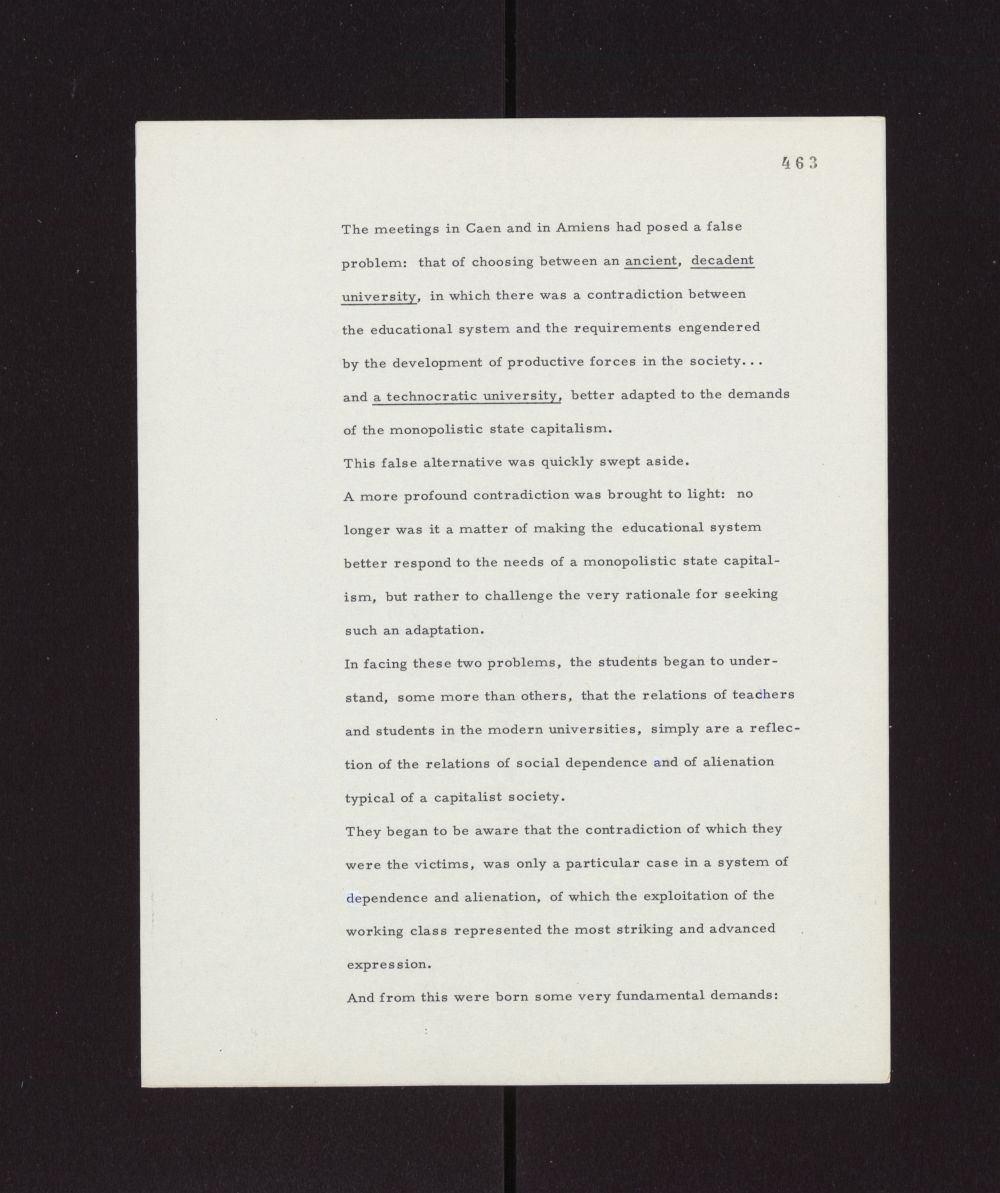

6
The meetings in Caen and in A.miens had posed a false
problem: that of choosing between an ancient, decadent
, in which there was a contradiction bet-ween
problem: that of choosing between an ancient, decadent
, in which there was a contradiction bet-ween
the educational system and the requirements engendered
by the development of productive forces in the society. . .
by the development of productive forces in the society. . .
and a _te c hnoc r ati c ^ uni v e r s ity , better adapted to the demands
of the monopolistic state capitalism.
This false alternative was quickly swept aside.
A more profound contradiction "was brought to light: no
longer "was it a matter of making the educational system
better respond to the needs of a monopolistic state capital-
ism, but rather to challenge the very rationale for seeking
such an adaptation.
In facing these two problems, the students began to under-
stand, some more than others, that the relations of teachers
and students in the modern universities, simply are a reflec-
tion of the relations of social dependence and of alienation
typical of a capitalist society.
They began to be aware that the contradiction of which they
were the victims, was only a particular case in a system of
dependence and alienation, of -which the exploitation of the
working class represented the most striking and advanced
expression.
And from this were born some very fundamental demands:
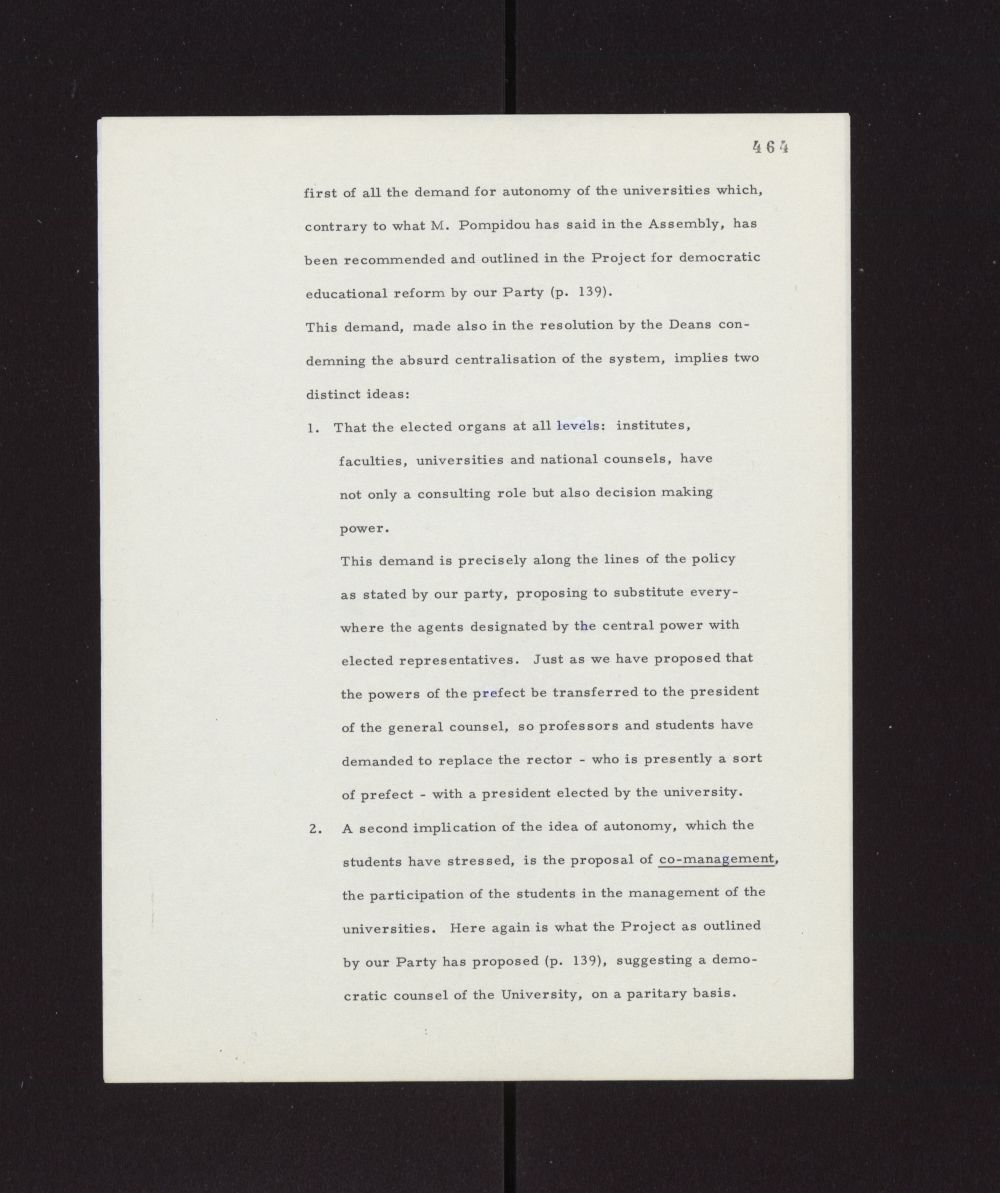

4 6 "4
first of all the demand for autonomy of the universities which,
contrary to what M. Pompidou has said in the Assembly, has
been recommended and outlined in the Project for democratic
educational reform by our Party (p. 139).
contrary to what M. Pompidou has said in the Assembly, has
been recommended and outlined in the Project for democratic
educational reform by our Party (p. 139).
This demand, made also in the resolution by the Deans con-
demning the absurd centralisation of the system., implies two
distinct ideas:
demning the absurd centralisation of the system., implies two
distinct ideas:
1. That the elected organs at all levels: institutes,
faculties, universities and national counsels, have
not only a consulting role but also decision making
power.
not only a consulting role but also decision making
power.
This demand is precisely along the lines of the policy
as stated by our party, proposing to substitute every-
where the agents designated by the central power with
elected representatives. Just as we have proposed that
the powers of the prefect be transferred to the president
of the general counsel, so professors and students have
demanded to replace the rector - who is presently a sort
of prefect - with a president elected by the university.
as stated by our party, proposing to substitute every-
where the agents designated by the central power with
elected representatives. Just as we have proposed that
the powers of the prefect be transferred to the president
of the general counsel, so professors and students have
demanded to replace the rector - who is presently a sort
of prefect - with a president elected by the university.
2. A second implication of the idea of autonomy, "which the
students have stressed, is the proposal of co-.management,
the participation of the students in the management of the
universities. Here again is what the Project as outlined
by our Party has proposed (p. 139), suggesting a demo-
cratic counsel of the University, on a paritary basis.
students have stressed, is the proposal of co-.management,
the participation of the students in the management of the
universities. Here again is what the Project as outlined
by our Party has proposed (p. 139), suggesting a demo-
cratic counsel of the University, on a paritary basis.
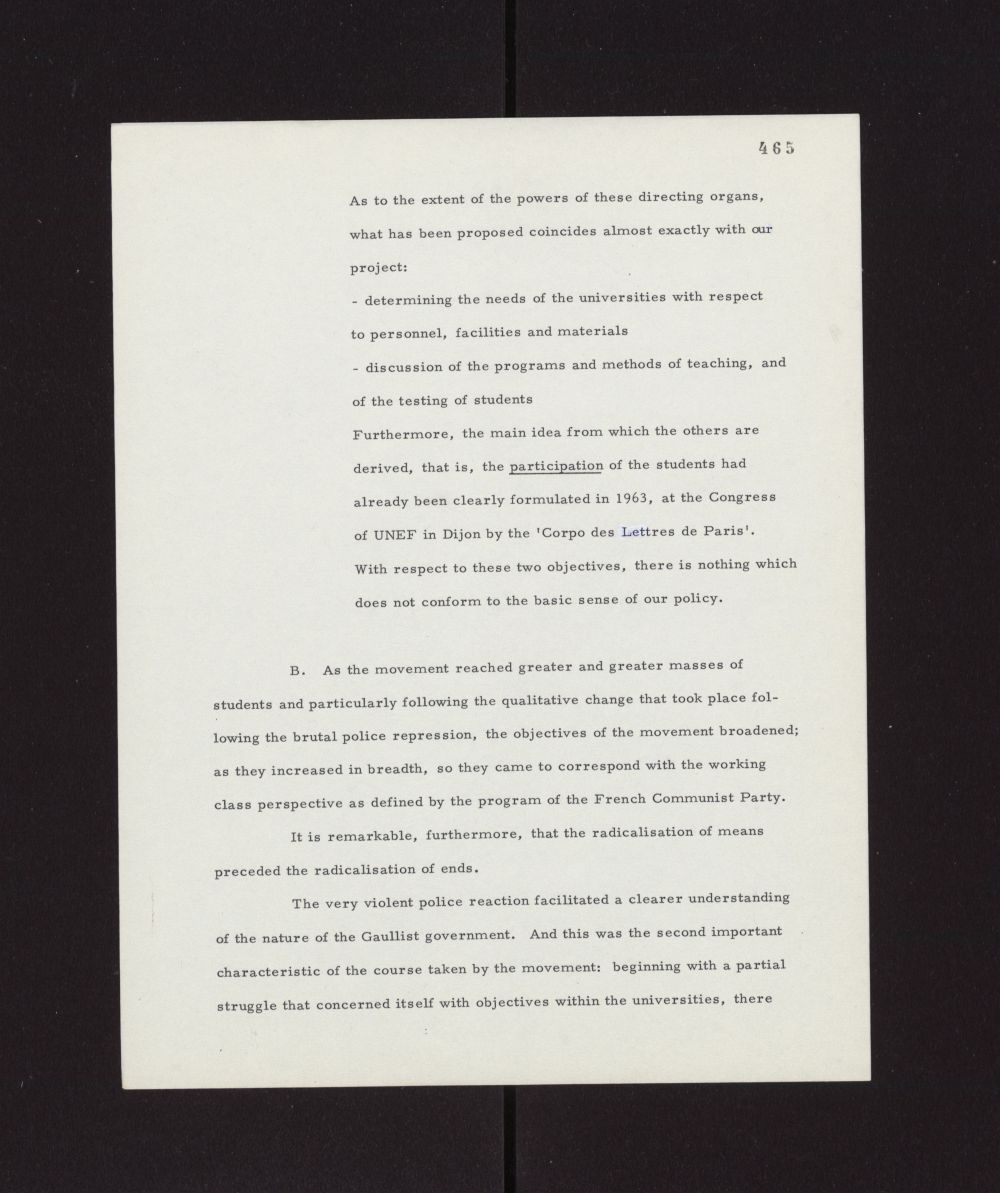

As to the extent of the powers of these directing organs,
what has been proposed coincides almost exactly with our
project;
what has been proposed coincides almost exactly with our
project;
- determining the needs of the universities with respect
to personnel, facilities and .materials
to personnel, facilities and .materials
- discussion of the programs and methods of teaching, and
of the testing of students
of the testing of students
Furthermore, the main idea from "which the others are
derived, that is, the £§£ti£rp_ation of the students had
already been clearly formulated in 1963, at the Congress
of UNEF in Dijon by the 'Corpo des Lettres de Paris'.
With respect to these two objectives, there is nothing which
does not conform to the basic sense of our policy.
derived, that is, the £§£ti£rp_ation of the students had
already been clearly formulated in 1963, at the Congress
of UNEF in Dijon by the 'Corpo des Lettres de Paris'.
With respect to these two objectives, there is nothing which
does not conform to the basic sense of our policy.
B. As the movement reached greater and greater masses of
students and, particularly following the qualitative change that took place fol-
lowing the brutal police repression, the objectives of the movement broadened;
as they increased in breadth, so they came to correspond -with the -working
class perspective as defined by the program of the French Communist Party.
students and, particularly following the qualitative change that took place fol-
lowing the brutal police repression, the objectives of the movement broadened;
as they increased in breadth, so they came to correspond -with the -working
class perspective as defined by the program of the French Communist Party.
It is remarkable, furthermore, that the radicalisation of means
preceded the radicalisation of ends.
preceded the radicalisation of ends.
The very violent police reaction facilitated a clearer understanding
of the nature of the Gaullist government. And this was the second important
characteristic of the course taken by the movement: beginning "with a partial
struggle that concerned itself with objectives "within the universities, there
of the nature of the Gaullist government. And this was the second important
characteristic of the course taken by the movement: beginning "with a partial
struggle that concerned itself with objectives "within the universities, there
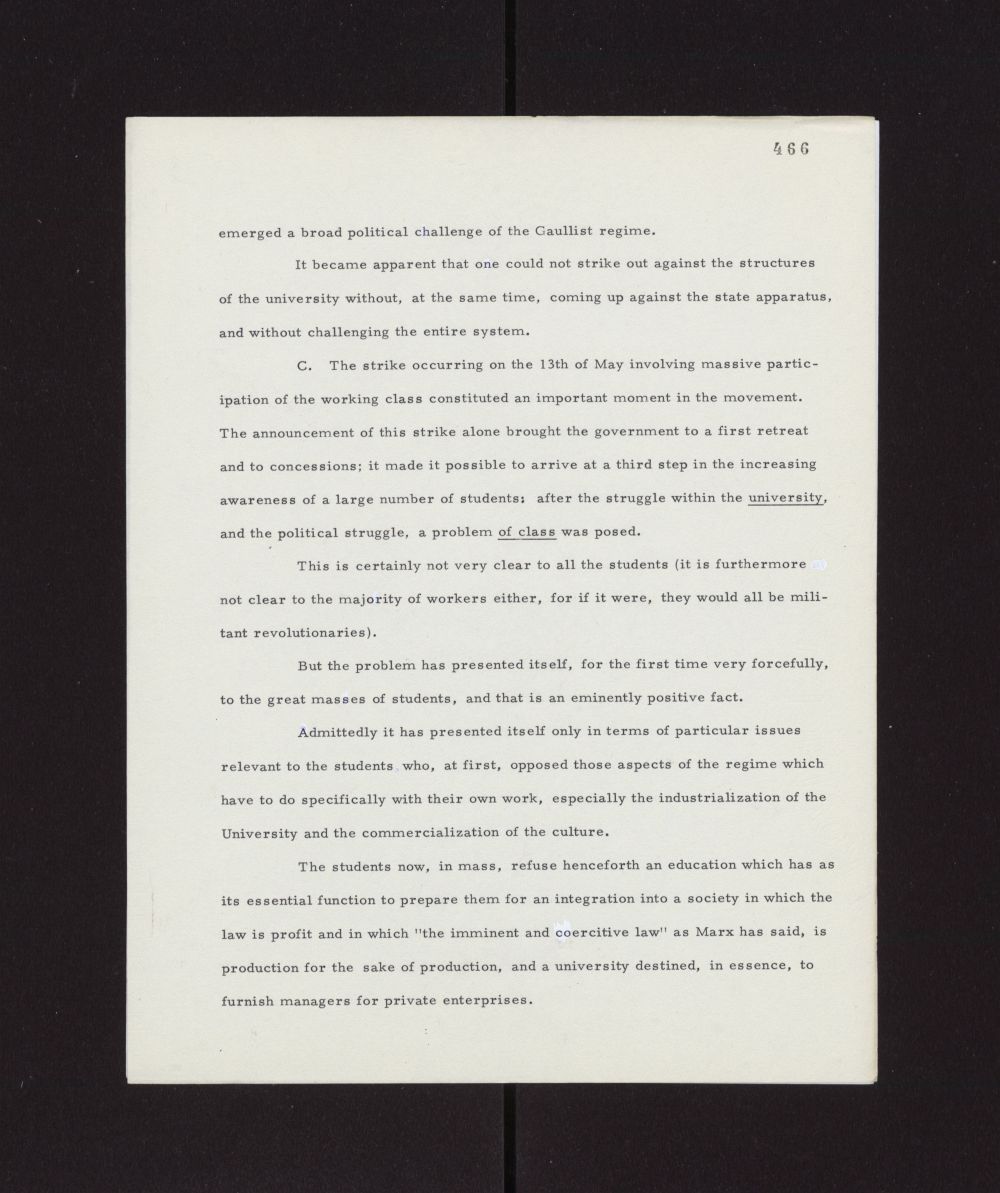

466
emerged a broad political challenge of the Gaullist regim.e.
It became apparent that one could not strike out against the structures
of the university without, at the same time, coming up against the state apparatus,
and •without challenging the entire system,
of the university without, at the same time, coming up against the state apparatus,
and •without challenging the entire system,
C. The strike occurring on the 13th of May involving massive partic-
ipation of the working class constituted an important moment in the movement.
The announcement of this strike alone brought the government to a first retreat
and to concessions; it made it possible to arrive at a third step in the increasing
awareness of a large number of students: after the struggle -within the university,
and the political struggle, a problem, o^cla^^ -was posed,
ipation of the working class constituted an important moment in the movement.
The announcement of this strike alone brought the government to a first retreat
and to concessions; it made it possible to arrive at a third step in the increasing
awareness of a large number of students: after the struggle -within the university,
and the political struggle, a problem, o^cla^^ -was posed,
This is certainly not very clear to all the students (it is furthermore
not clear to the majority of workers either, for if it -were, they would all be mili-
tant revolutionaries).
not clear to the majority of workers either, for if it -were, they would all be mili-
tant revolutionaries).
But the problem has presented itself, for the first time very forcefully,
to the great masses of students, and. that is an eminently positive fact.
to the great masses of students, and. that is an eminently positive fact.
Admittedly it has presented itself only in terms of particular issues
relevant to the students -who, at first, opposed those aspects of the regime which
have to do specifically with their own "work, especially the industrialization of the
University and the commercialization of the culture.
relevant to the students -who, at first, opposed those aspects of the regime which
have to do specifically with their own "work, especially the industrialization of the
University and the commercialization of the culture.
The students now, in mass, refuse henceforth an education which has as
its essential function to prepare them for an integration into a society in -which the
law is profit and in which "the imminent and coercitive law" as Marx has said> is
production for the sake of production, and a university destined, in essence, to
furnish managers for private enterprises.
its essential function to prepare them for an integration into a society in -which the
law is profit and in which "the imminent and coercitive law" as Marx has said> is
production for the sake of production, and a university destined, in essence, to
furnish managers for private enterprises.
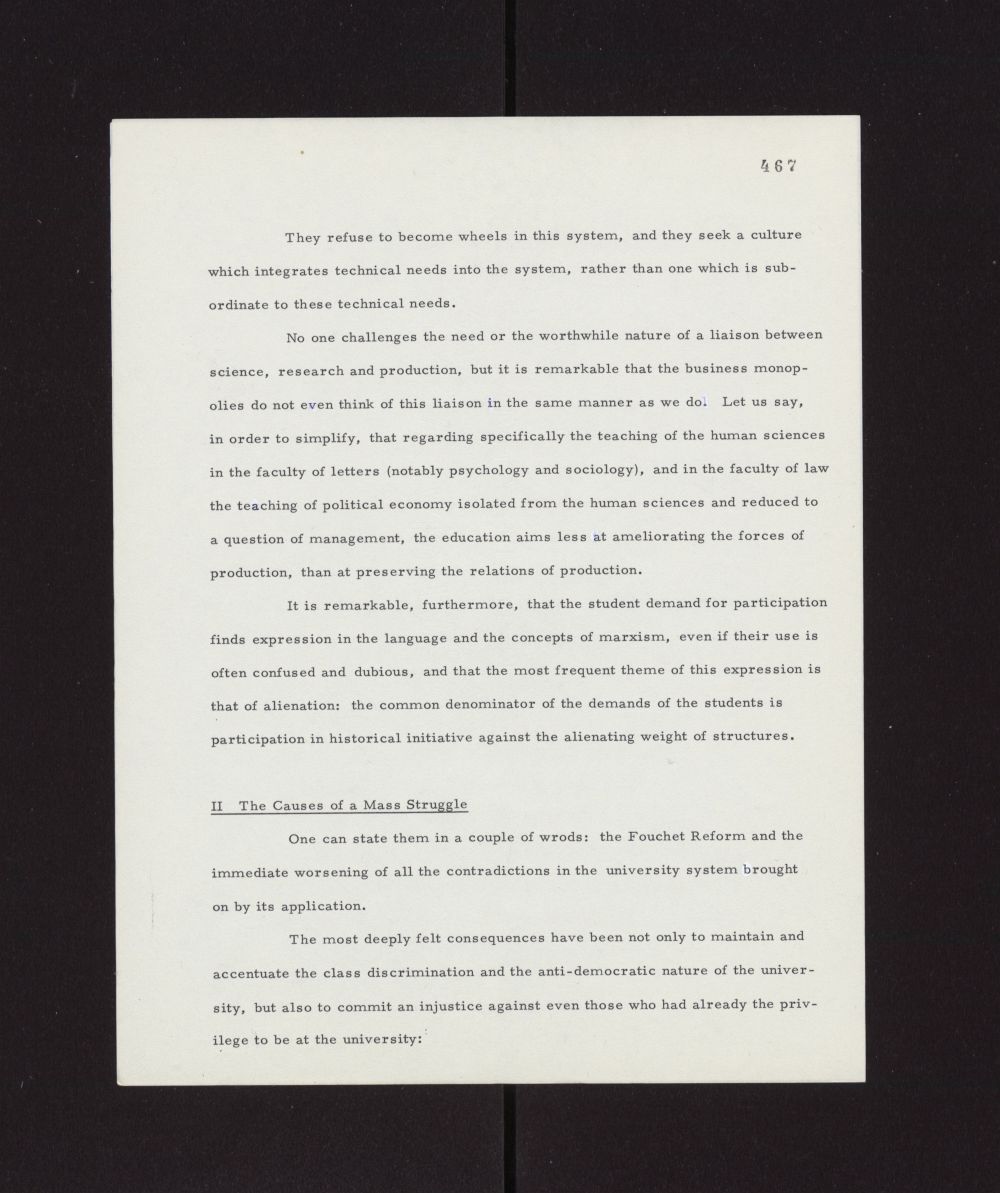

4 6 7
They refuse to become wheels in this system, and they seek a culture
which Integrates technical needs Into the system, rather than one which is sub-
ordinate to these technical needs.
which Integrates technical needs Into the system, rather than one which is sub-
ordinate to these technical needs.
No one challenges the need or the worthwhile nature of a liaison between
science, research and production, but It Is remarkable that the business monop-
olies do not even think of this liaison In the same manner as we do. Let us say,
in order to simplify, that regarding specifically the teaching of the human sciences
in the faculty of letters (notably psychology and sociology), and in the faculty of law
the teaching of political economy isolated from the human sciences and reduced to
a question of management, the education aims less at ameliorating the forces of
production, than at preserving the relations of production.
science, research and production, but It Is remarkable that the business monop-
olies do not even think of this liaison In the same manner as we do. Let us say,
in order to simplify, that regarding specifically the teaching of the human sciences
in the faculty of letters (notably psychology and sociology), and in the faculty of law
the teaching of political economy isolated from the human sciences and reduced to
a question of management, the education aims less at ameliorating the forces of
production, than at preserving the relations of production.
It is remarkable, furthermore, that the student demand for participation
finds expression in the language and the concepts of marxism, even If their use Is
often confused and dubious, and that the most frequent theme of this expression Is
that of alienation: the common denominator of the demands of the students is
participation in historical Initiative against the alienating weight of structures.
finds expression in the language and the concepts of marxism, even If their use Is
often confused and dubious, and that the most frequent theme of this expression Is
that of alienation: the common denominator of the demands of the students is
participation in historical Initiative against the alienating weight of structures.
II T h e Cau es
S t r ug g 1 e
One can state them in a couple of wrods: the Fouchet Reform and the
Immediate •worsening of all the contradictions in the university system brought
on by Its application.
on by Its application.
The most deeply felt consequences have been not only to maintain and
accentuate the class discrimination and the anti- democratic nature of the univer-
sity, but also to commit an Injustice against even those who had already the priv-
ilege to be at the university:
accentuate the class discrimination and the anti- democratic nature of the univer-
sity, but also to commit an Injustice against even those who had already the priv-
ilege to be at the university:
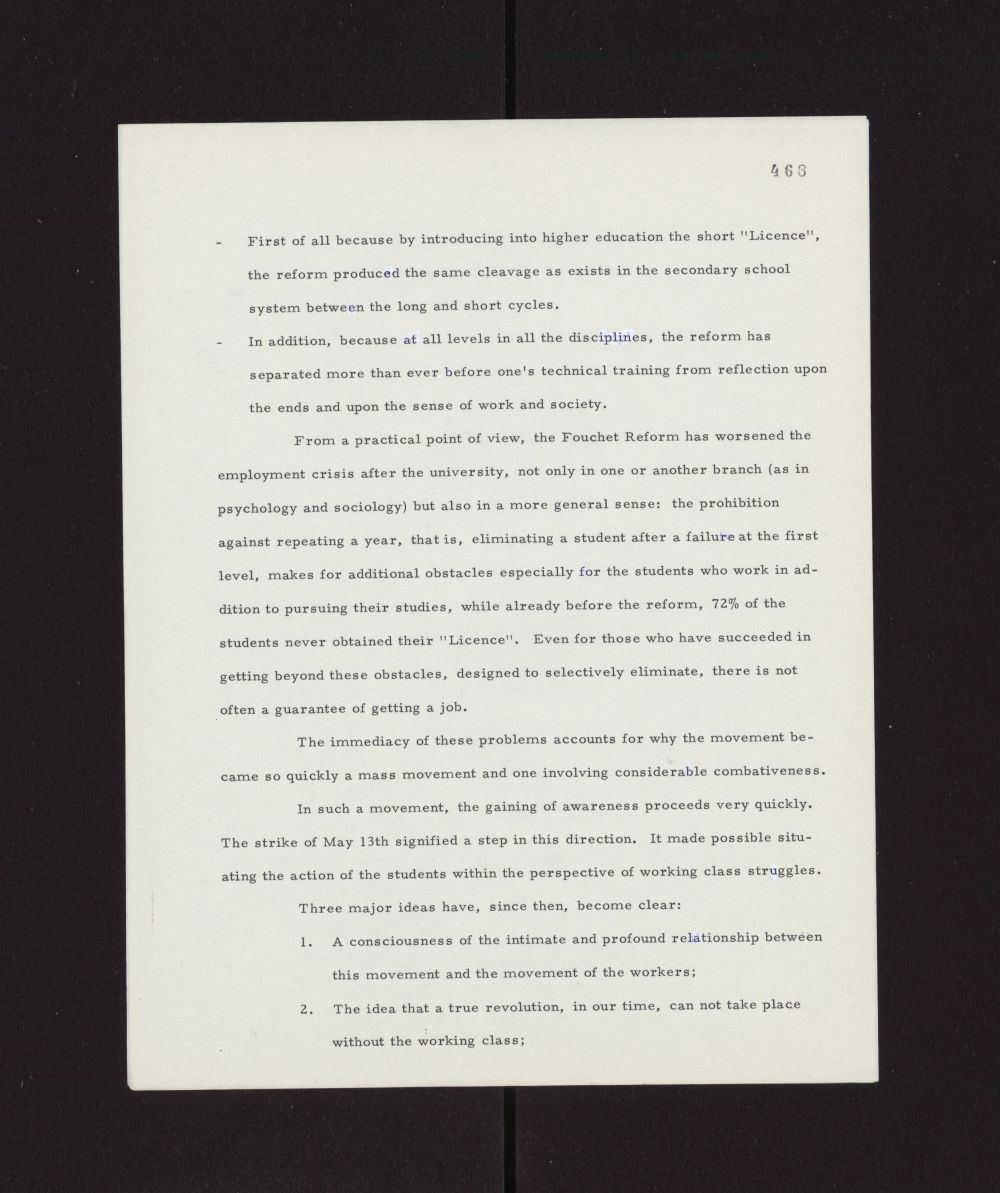

First of all because by introducing into higher education the short "Licence",
the reform, produced the same cleavage as exists in the secondary school
system between the long and short cycles.
the reform, produced the same cleavage as exists in the secondary school
system between the long and short cycles.
In addition, because at all levels in all the disciplines, the reform has
separated more than ever before one's technical training from reflection upon
the ends and. upon the sense of work and society.
separated more than ever before one's technical training from reflection upon
the ends and. upon the sense of work and society.
From a practical point of view, the Fouchet Reform has worsened the
employment crisis after the university, not only in one or another branch (as in
psychology and sociology) but also in a more general sense: the prohibition
against repeating a year, that is, eliminating a student after a failure at the first
level, makes for additional obstacles especially for the students who •work in ad-
dition to pursuing their studies, while already before the reform, 72% of the
students never obtained their "Licence", Even for those who have succeeded in
getting beyond these obstacles, designed to selectively eliminate, there is not
often a guarantee of getting a job.
employment crisis after the university, not only in one or another branch (as in
psychology and sociology) but also in a more general sense: the prohibition
against repeating a year, that is, eliminating a student after a failure at the first
level, makes for additional obstacles especially for the students who •work in ad-
dition to pursuing their studies, while already before the reform, 72% of the
students never obtained their "Licence", Even for those who have succeeded in
getting beyond these obstacles, designed to selectively eliminate, there is not
often a guarantee of getting a job.
The immediacy of these problems accounts for -why the movement be-
came so quickly a mass movement and one involving considerable combativeness.
came so quickly a mass movement and one involving considerable combativeness.
In such a movement, the gaining of awareness proceeds very quickly.
The strike of May 13th signified a step in this direction. It made possible situ-
ating the action of the students within the perspective of working class struggles.
Three major ideas have, since then, become clear;
The strike of May 13th signified a step in this direction. It made possible situ-
ating the action of the students within the perspective of working class struggles.
Three major ideas have, since then, become clear;
1. A consciousness of the intimate and profound relationship between
this movement and the movement of the workers;
this movement and the movement of the workers;
2. The idea that a true revolution, in our time, can not take place
without the working class;
without the working class;
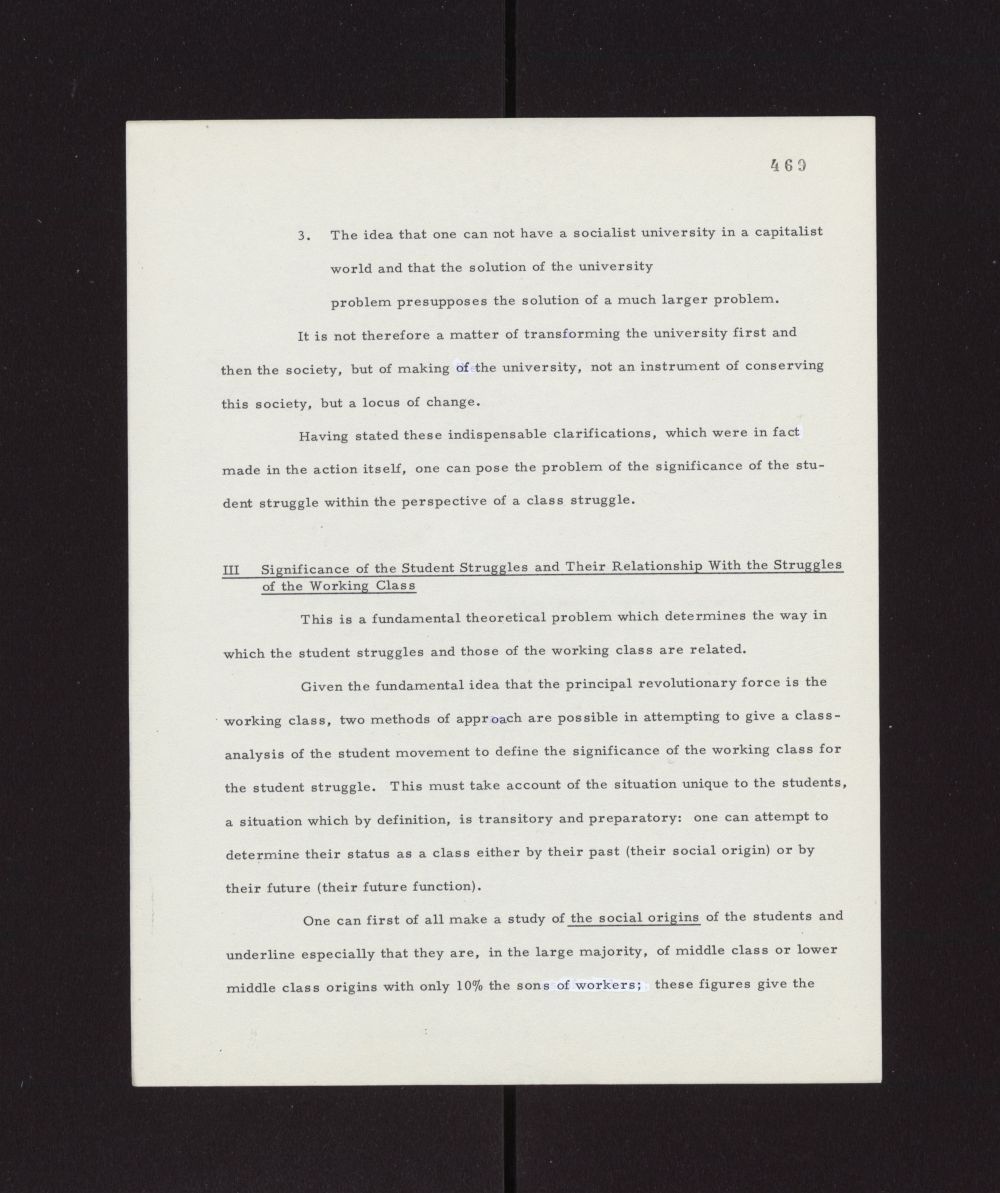

463
3, The idea that one can not have a socialist university in a capitalist
"world and that the solution of the university
"world and that the solution of the university
problem presupposes the solution of a much larger problem.
It is not therefore a matter of transforming the university first and
then the society, but of making of the university, not an instrument of conserving
this society, but a locus of change.
It is not therefore a matter of transforming the university first and
then the society, but of making of the university, not an instrument of conserving
this society, but a locus of change.
Having stated these indispensable clarifications, -which were in fact
made in the action itself, one can pose the problem, of the significance of the stu-
dent struggle within the perspective of a class struggle.
made in the action itself, one can pose the problem, of the significance of the stu-
dent struggle within the perspective of a class struggle.
Ill Significance of the^jStu^dent^Struggle's and Their Relationship With Jiie Struggles
of the ^WorkingClass
of the ^WorkingClass
This is a fundamental theoretical problem which determines the way in
•which the student struggles and those of the "working class are related.
•which the student struggles and those of the "working class are related.
Given the fundamental idea that the principal revolutionary force is the
working class, two methods of approach are possible in attempting to give a class-
analysis of the student movement to define the significance of the working class for
the student struggle. This must take account of the situation unique to the students,
a situation which by definition, is transitory and preparatory: one can attempt to
determine their status as a class either by their past (their social origin) or by
their future (their future function).
working class, two methods of approach are possible in attempting to give a class-
analysis of the student movement to define the significance of the working class for
the student struggle. This must take account of the situation unique to the students,
a situation which by definition, is transitory and preparatory: one can attempt to
determine their status as a class either by their past (their social origin) or by
their future (their future function).
One can first of all make a study of the social origins of the students and
underline especially that they are, in the large majority, of middle class or lower
middle class origins with only 10% the sons of workers; these figures give the
underline especially that they are, in the large majority, of middle class or lower
middle class origins with only 10% the sons of workers; these figures give the
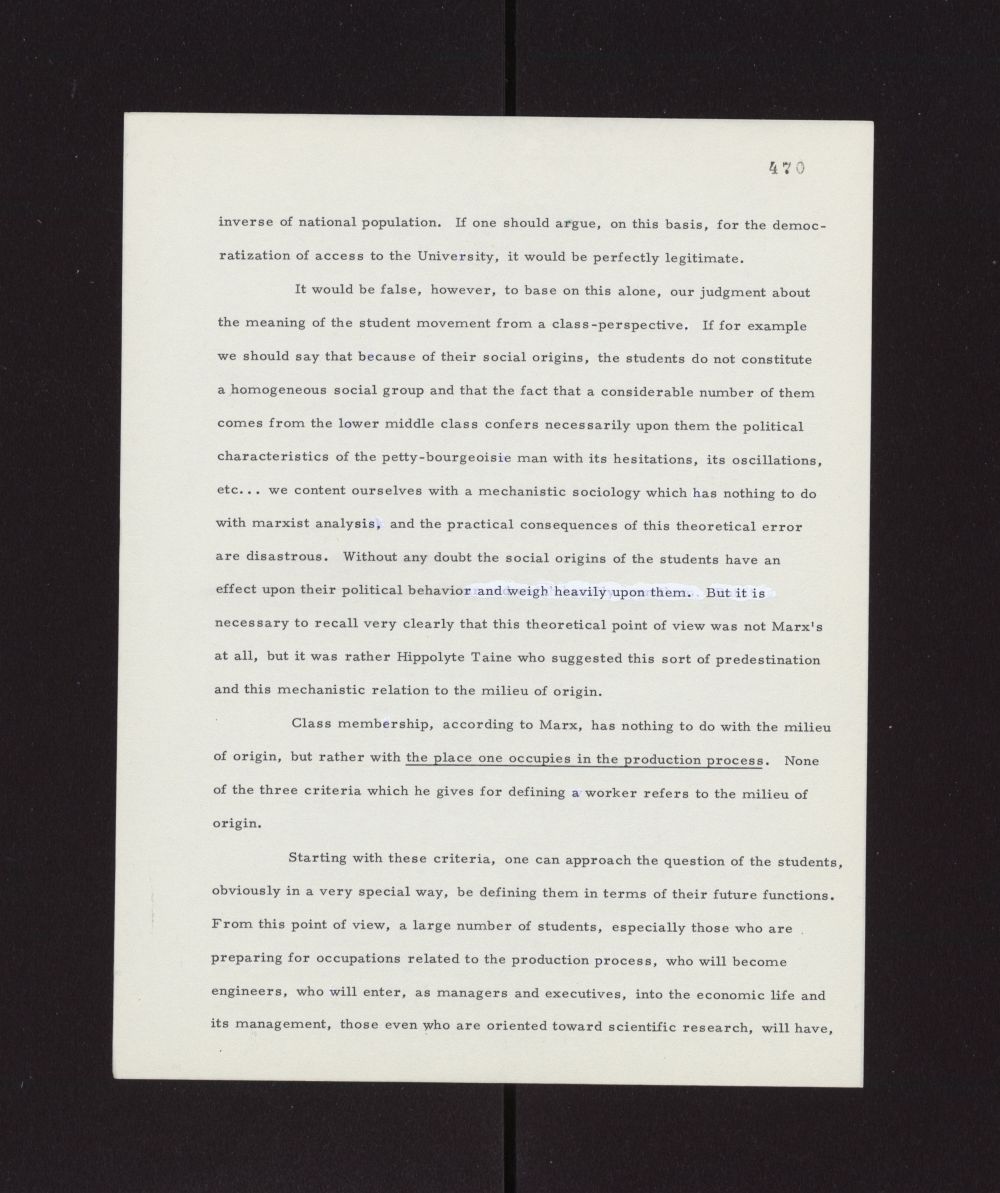

inverse of national population. If one should argue, on this basis, for the democ-
ratization of access to the University, it would be perfectly legitimate.
ratization of access to the University, it would be perfectly legitimate.
It "would be false, however, to base on this alone, our judgment about
the meaning of the student movement from a class-perspective. If for example
we should say that because of their social origins, the students do not constitute
a homogeneous social group and that the fact that a considerable number of them
comes from the lower middle class confers necessarily upon them the political
characteristics of the petty-bourgeoisie man with its hesitations, its oscillations,
etc. . . we content ourselves with a mechanistic sociology which has nothing to do
with marxist analysis, and the practical consequences of this theoretical error
are disastrous. Without any doubt the social origins of the students have an
effect upon their political behavior and weigh heavily upon them. But it is
necessary to recall very clearly that this theoretical point of view "was not Marx's
at all, but it -was rather Hippolyte Taine who suggested this sort of predestination
and this mechanistic relation to the milieu of origin.
the meaning of the student movement from a class-perspective. If for example
we should say that because of their social origins, the students do not constitute
a homogeneous social group and that the fact that a considerable number of them
comes from the lower middle class confers necessarily upon them the political
characteristics of the petty-bourgeoisie man with its hesitations, its oscillations,
etc. . . we content ourselves with a mechanistic sociology which has nothing to do
with marxist analysis, and the practical consequences of this theoretical error
are disastrous. Without any doubt the social origins of the students have an
effect upon their political behavior and weigh heavily upon them. But it is
necessary to recall very clearly that this theoretical point of view "was not Marx's
at all, but it -was rather Hippolyte Taine who suggested this sort of predestination
and this mechanistic relation to the milieu of origin.
Class membership, according to Marx, has nothing to do with the milieu
of origin, but rather with the^glace one occupies in the production process. None
of the three criteria which he gives for defining a worker refers to the milieu of
origin.
of origin, but rather with the^glace one occupies in the production process. None
of the three criteria which he gives for defining a worker refers to the milieu of
origin.
Starting -with these criteria, one can approach the question of the students,
obviously in a very special way, be defining them in terms of their future functions.
From this point of view, a large number of students, especially those -who are
preparing for occupations related to the production process, who will become
engineers, -who will enter, as managers and executives, into the economic life and
its management, those even -who are oriented toward scientific research, will have,
obviously in a very special way, be defining them in terms of their future functions.
From this point of view, a large number of students, especially those -who are
preparing for occupations related to the production process, who will become
engineers, -who will enter, as managers and executives, into the economic life and
its management, those even -who are oriented toward scientific research, will have,
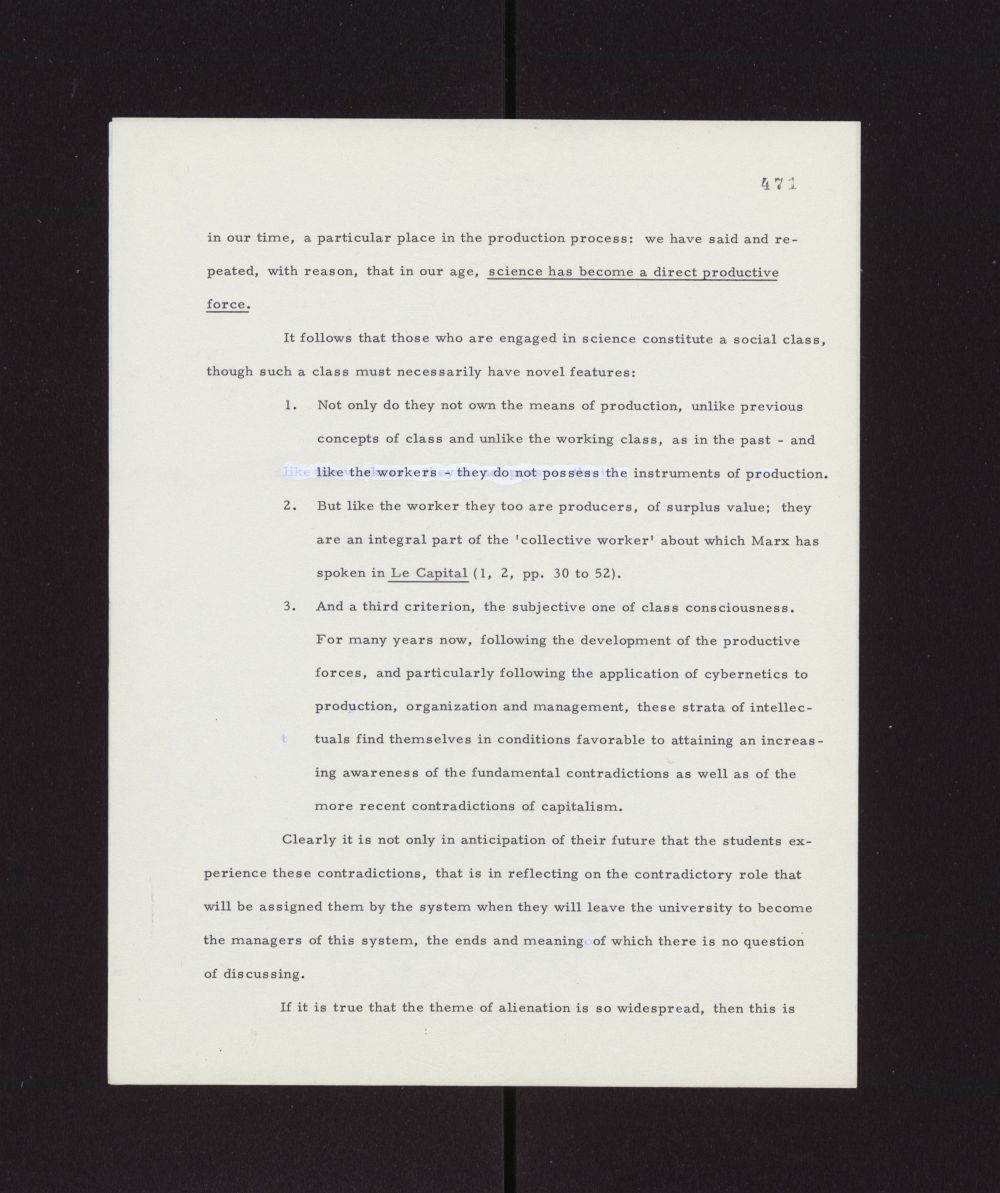

in our time, a particular place in the production process: we have said and re-
peated, with reason, that in our age, science has become a direct productive
forces
peated, with reason, that in our age, science has become a direct productive
forces
It follows that those -who are engaged in. science constitute a social class,
though such a class must necessarily have novel features:
though such a class must necessarily have novel features:
1. Not only do they not own the means of production, unlike previous
concepts of class and unlike the working class, as in the past - and
like the workers - they do not possess the instruments of production.
concepts of class and unlike the working class, as in the past - and
like the workers - they do not possess the instruments of production.
2. But like the worker they too are producers, of surplus value; they
are an integral part of the 'collective worker1 about which Marx has
spoken, in Le Capital (1, Z, pp. 30 to 52).
are an integral part of the 'collective worker1 about which Marx has
spoken, in Le Capital (1, Z, pp. 30 to 52).
3. And a third criterion, the subjective one of class consciousness.
For many years now, following the development of the productive
forces, and particularly following the application of cybernetics to
production, organization and management, these strata of intellec-
tuals find themselves in conditions favorable to attaining an increas-
ing awareness of the fundamental contradictions as -well as of the
more recent contradictions of capitalism.
For many years now, following the development of the productive
forces, and particularly following the application of cybernetics to
production, organization and management, these strata of intellec-
tuals find themselves in conditions favorable to attaining an increas-
ing awareness of the fundamental contradictions as -well as of the
more recent contradictions of capitalism.
Clearly it is not only in anticipation of their future that the students ex-
perience these contradictions, that is in reflecting on the contradictory role that
will be assigned them by the system when they -will leave the university to become
the managers of this system, the ends and meaning of which there is no question
of discussing.
perience these contradictions, that is in reflecting on the contradictory role that
will be assigned them by the system when they -will leave the university to become
the managers of this system, the ends and meaning of which there is no question
of discussing.
If it is true that the theme of alienation is so widespread, then this is
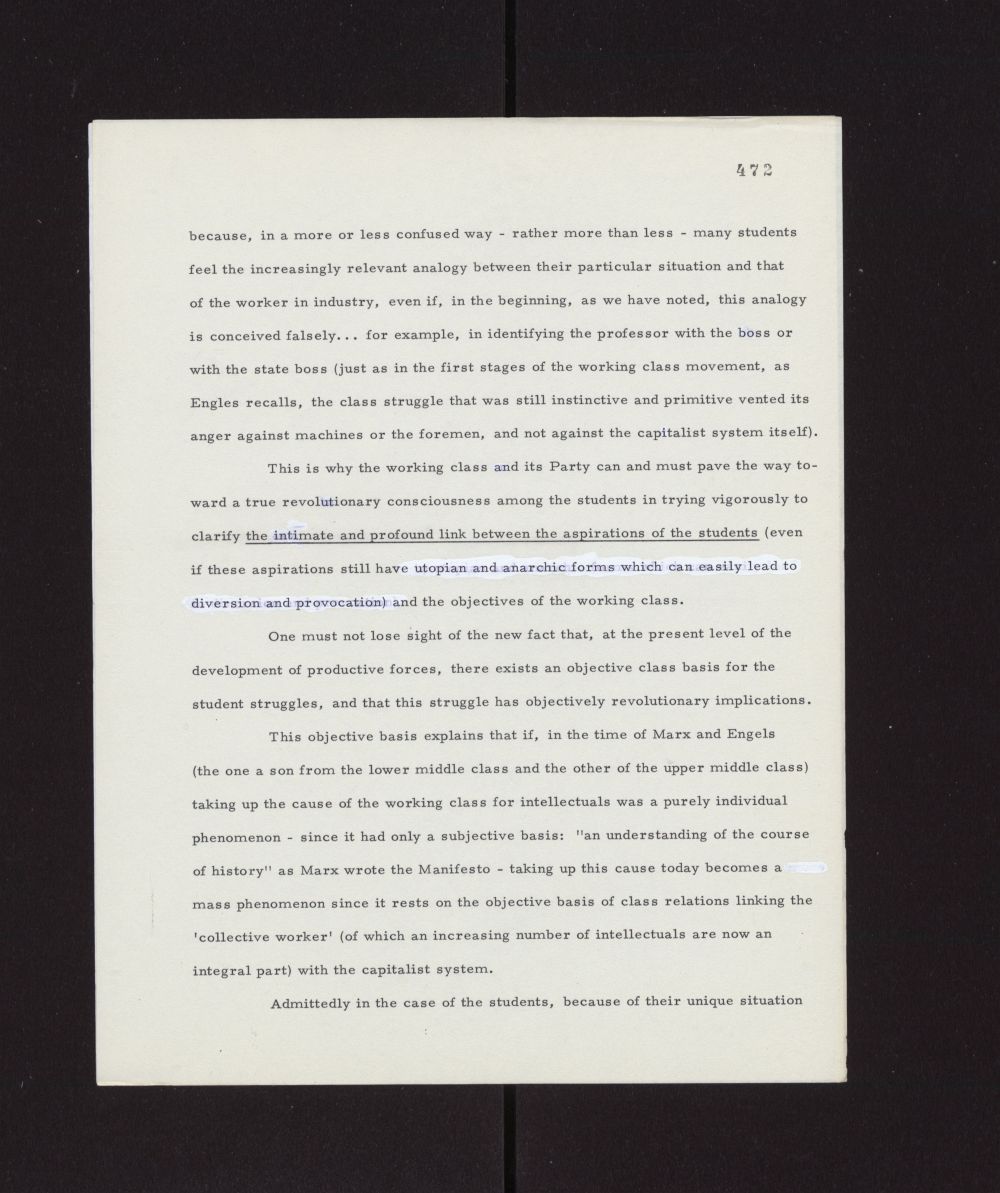

472
because, in a more or less confused way - rather more than less - many students
feel the increasingly relevant analogy bet-ween their particular situation and that
of the worker in industry, even if, in the beginning, as we have noted, this analogy
is conceived falsely. . . for example, in identifying the professor -with the boss or
with the state boss (just as in the first stages of the working class movement, as
Engles recalls, the class struggle that was still instinctive and primitive vented its
anger against machines or the foremen, and not against the capitalist system itself),
feel the increasingly relevant analogy bet-ween their particular situation and that
of the worker in industry, even if, in the beginning, as we have noted, this analogy
is conceived falsely. . . for example, in identifying the professor -with the boss or
with the state boss (just as in the first stages of the working class movement, as
Engles recalls, the class struggle that was still instinctive and primitive vented its
anger against machines or the foremen, and not against the capitalist system itself),
This is why the "working class and its Party can and must pave the way to-
ward a true revolutionary consciousness among the students in trying vigorously to
clarify the intimate and profound link b^tween_jthe aspirations of the students (even
if these aspirations still have Utopian and anarchic forms which can easily lead to
diversion and provocation) and the objectives of the working class.
ward a true revolutionary consciousness among the students in trying vigorously to
clarify the intimate and profound link b^tween_jthe aspirations of the students (even
if these aspirations still have Utopian and anarchic forms which can easily lead to
diversion and provocation) and the objectives of the working class.
One must not lose sight of the new fact that, at the present level of the
development of productive forces, there exists an objective class basis for the
student struggles, and that this struggle has objectively revolutionary implications.
development of productive forces, there exists an objective class basis for the
student struggles, and that this struggle has objectively revolutionary implications.
This objective basis explains that if, in the time of Marx and Engels
(the one a son from the lower middle class and the other of the upper middle class)
taking up the cause of the 'working class for intellectuals was a purely individual
phenomenon - since it had only a subjective basis; "an understanding of the course
of history" as Marx wrote the Manifesto - taking up this cause today becomes a
mass phenomenon since it rests on the objective basis of class relations linking the
'collective worker' (of "which an increasing number of intellectuals are now an
integral part) with the capitalist system.
(the one a son from the lower middle class and the other of the upper middle class)
taking up the cause of the 'working class for intellectuals was a purely individual
phenomenon - since it had only a subjective basis; "an understanding of the course
of history" as Marx wrote the Manifesto - taking up this cause today becomes a
mass phenomenon since it rests on the objective basis of class relations linking the
'collective worker' (of "which an increasing number of intellectuals are now an
integral part) with the capitalist system.
Admittedly in the case of the students, because of their unique situation
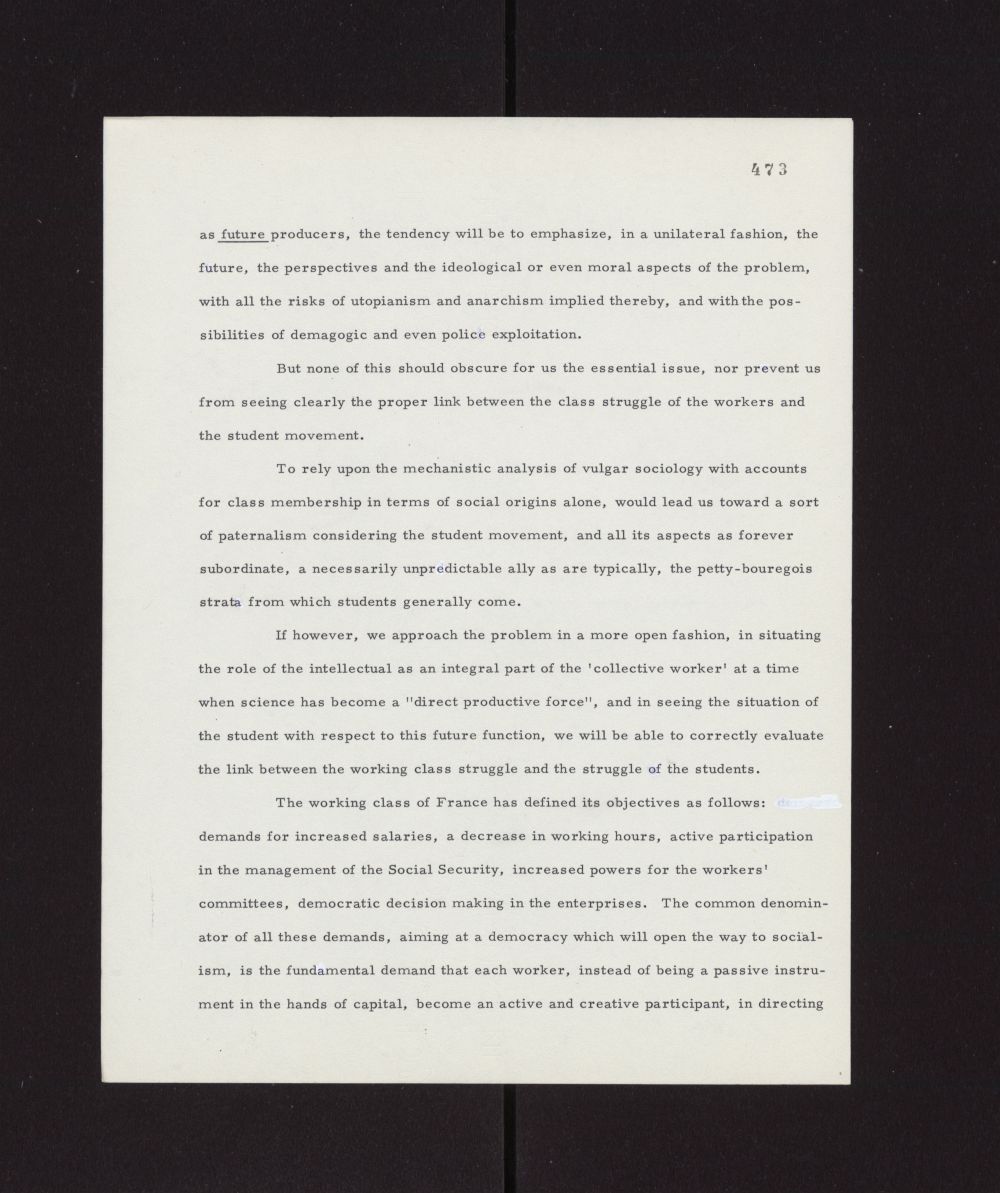

I t>
as jfuture_producers, the tendency will be to emphasize, in a unilateral fashion, the
future:, the perspectives and the ideological or even moral aspects of the problem,
•with all the risks of utopianism and anarchism Implied thereby, and 'withthe pos-
sibilities of demagogic and even police exploitation.
•with all the risks of utopianism and anarchism Implied thereby, and 'withthe pos-
sibilities of demagogic and even police exploitation.
But none of this should obscure for us the essential issue, nor prevent us
from seeing clearly the proper link between the class struggle of the workers and
the student movement.
from seeing clearly the proper link between the class struggle of the workers and
the student movement.
To rely upon the mechanistic analysis of vulgar sociology "with accounts
for class membership in terms of social origins alone, would lead us toward, a sort
of paternalism considering the student movement, and all its aspects as forever
subordinate, a necessarily unpredictable ally as are typically, the petty-bouregois
strata from 'which students generally come.
for class membership in terms of social origins alone, would lead us toward, a sort
of paternalism considering the student movement, and all its aspects as forever
subordinate, a necessarily unpredictable ally as are typically, the petty-bouregois
strata from 'which students generally come.
If however, we approach the problem in a .more open fashion, in situating
the role of the intellectual as an integral part of the 'collective worker1 at a time
when science has become a "direct productive force", and in seeing the situation of
the student with respect to this future function, -we will be able to correctly evaluate
the link between the working class struggle and the struggle of the students.
the role of the intellectual as an integral part of the 'collective worker1 at a time
when science has become a "direct productive force", and in seeing the situation of
the student with respect to this future function, -we will be able to correctly evaluate
the link between the working class struggle and the struggle of the students.
The working class of France has defined its objectives as follows:
demands for increased salaries, a decrease in "working hours, active participation
in the management of the Social Security, increased powers for the workers'
committees, democratic decision making in the enterprises. The common denomin-
ator of all these demands, aiming at a democracy which will open the -way to social-
ism, is the fundamental demand that each "worker, instead of being a passive instru-
ment in the hands of capital, become an active and creative participant, in directing
in the management of the Social Security, increased powers for the workers'
committees, democratic decision making in the enterprises. The common denomin-
ator of all these demands, aiming at a democracy which will open the -way to social-
ism, is the fundamental demand that each "worker, instead of being a passive instru-
ment in the hands of capital, become an active and creative participant, in directing
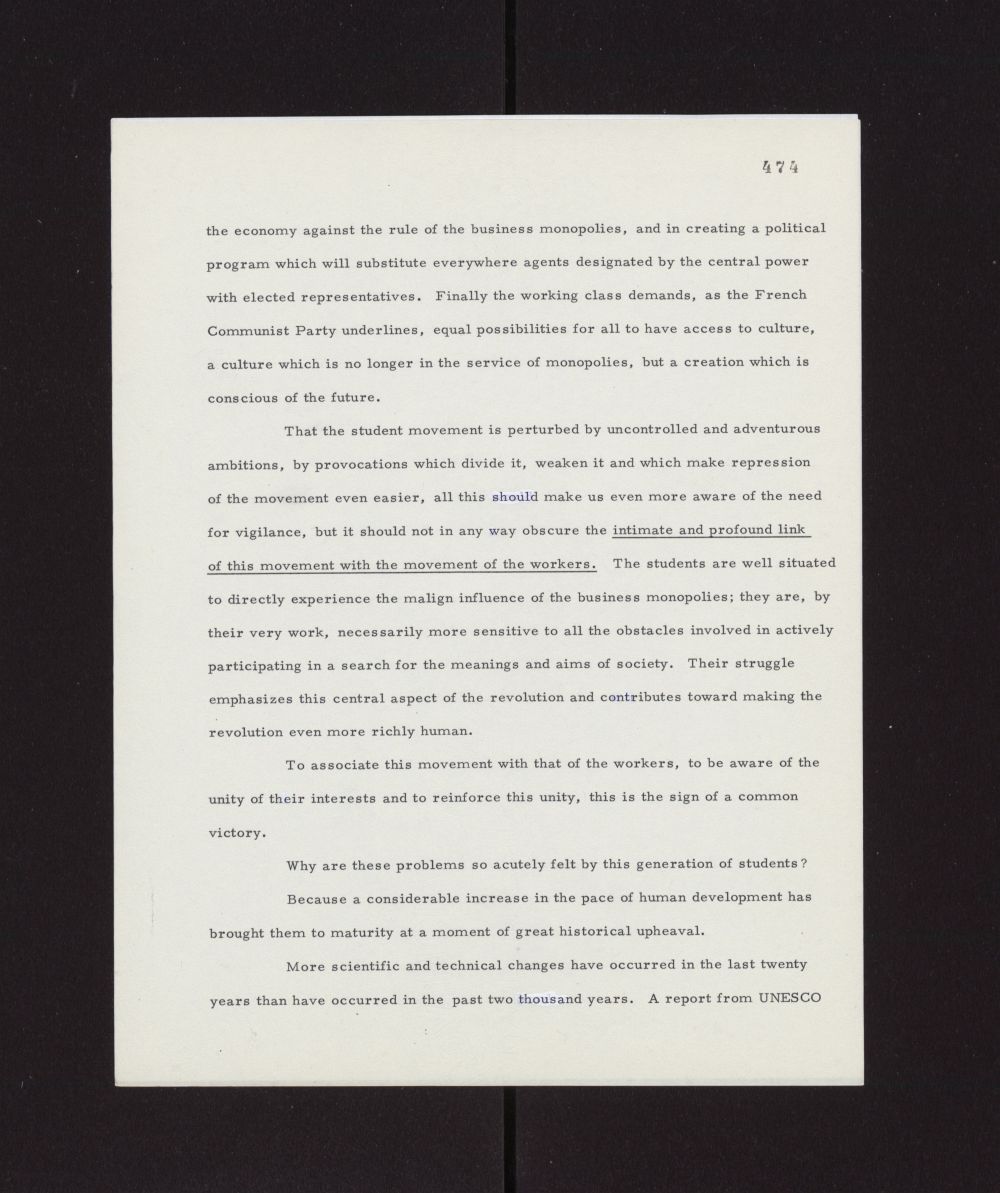

47*
the economy against the rule of the business monopolies, and in creating a political
program "which will substitute everywhere agents designated by the central power
•with elected representatives. Finally the working class demands, as the French
Communist Party underlines, equal possibilities for all to have access to culture,
a culture which is no longer in the service of monopolies, but a creation -which is
conscious of the future.
•with elected representatives. Finally the working class demands, as the French
Communist Party underlines, equal possibilities for all to have access to culture,
a culture which is no longer in the service of monopolies, but a creation -which is
conscious of the future.
That the student movement is perturbed by uncontrolled and adventurous
ambitions, by provocations which divide it, weaken it and which .make repression
of the movement even easier, all this should make us even more aware of the need
ambitions, by provocations which divide it, weaken it and which .make repression
of the movement even easier, all this should make us even more aware of the need
for vigilance, but it should not in any way obscure the intimate and profound.........link
of this^movement with^thj^rnoyement of the workjers. The students are "well situated
to directly experience the malign Influence of the business monopolies; they are, by
their very work, necessarily more sensitive to all the obstacles Involved In actively
participating in a search for the .meanings and aims of society. Their struggle
emphasizes this central aspect of the revolution and contributes toward making the
revolution even more richly human.
to directly experience the malign Influence of the business monopolies; they are, by
their very work, necessarily more sensitive to all the obstacles Involved In actively
participating in a search for the .meanings and aims of society. Their struggle
emphasizes this central aspect of the revolution and contributes toward making the
revolution even more richly human.
To associate this movement "with that of the workers, to be aware of the
unity of their interests and to reinforce this unity, this is the sign of a common
victory.
unity of their interests and to reinforce this unity, this is the sign of a common
victory.
Why are these problems so acutely felt by this generation of students?
Because a considerable increase in the pace of human development has
brought them to .maturity at a moment of great historical upheaval.
brought them to .maturity at a moment of great historical upheaval.
More scientific and technical changes have occurred in the last twenty
years than have occurred in the past two thousand years. A report from UNESCO
years than have occurred in the past two thousand years. A report from UNESCO
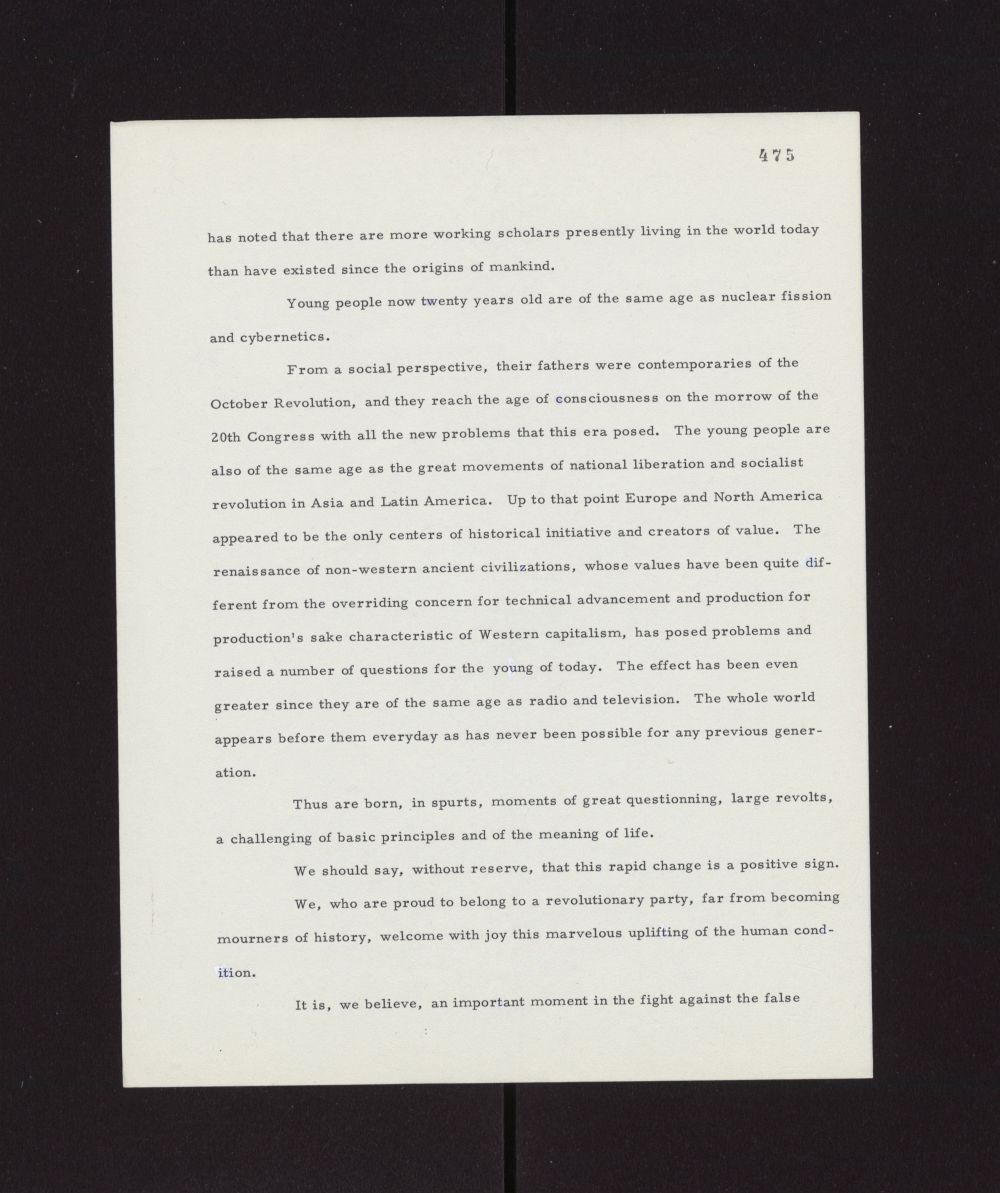

has noted that there are more 'working scholars presently living in the world today
than have existed since the origins of mankind.
than have existed since the origins of mankind.
Young people now twenty years old are of the same age as nuclear fission
and cybernetics.
and cybernetics.
From a social perspective, their fathers were contemporaries of the
October Revolution, and they reach the age of consciousness on the morrow of the
20th Congress -with all the new problems that this era posed. The young people are
also of the same age as the great movements of national liberation and socialist
revolution in Asia and Latin America. Up to that point Europe and North America
appeared to be the only centers of historical initiative and creators of value. The
renaissance of non-western ancient civilizations, whose values have been quite dif-
ferent from the overriding concern for technical advancement and production for
production's sake characteristic of Western capitalism, has posed problems and
raised a number of questions for the young of today. The effect has been eve;n
greater since they are of the same age as radio and television. The -whole -world
appears before them everyday as has never been possible for any previous gener-
ation.
October Revolution, and they reach the age of consciousness on the morrow of the
20th Congress -with all the new problems that this era posed. The young people are
also of the same age as the great movements of national liberation and socialist
revolution in Asia and Latin America. Up to that point Europe and North America
appeared to be the only centers of historical initiative and creators of value. The
renaissance of non-western ancient civilizations, whose values have been quite dif-
ferent from the overriding concern for technical advancement and production for
production's sake characteristic of Western capitalism, has posed problems and
raised a number of questions for the young of today. The effect has been eve;n
greater since they are of the same age as radio and television. The -whole -world
appears before them everyday as has never been possible for any previous gener-
ation.
Thus are born, in spurts, moments of great questionning, large revolts,
a challenging of basic principles and of the .meaning of life.
a challenging of basic principles and of the .meaning of life.
We should say, without reserve, that this rapid change is a positive sign.
We, who are proud to belong to a revolutionary party, far from becoming
mourners of history, welcome with joy this marvelous uplifting of the human cond-
mourners of history, welcome with joy this marvelous uplifting of the human cond-
ition.
It Is, we believe, an Important moment in the fight against the false
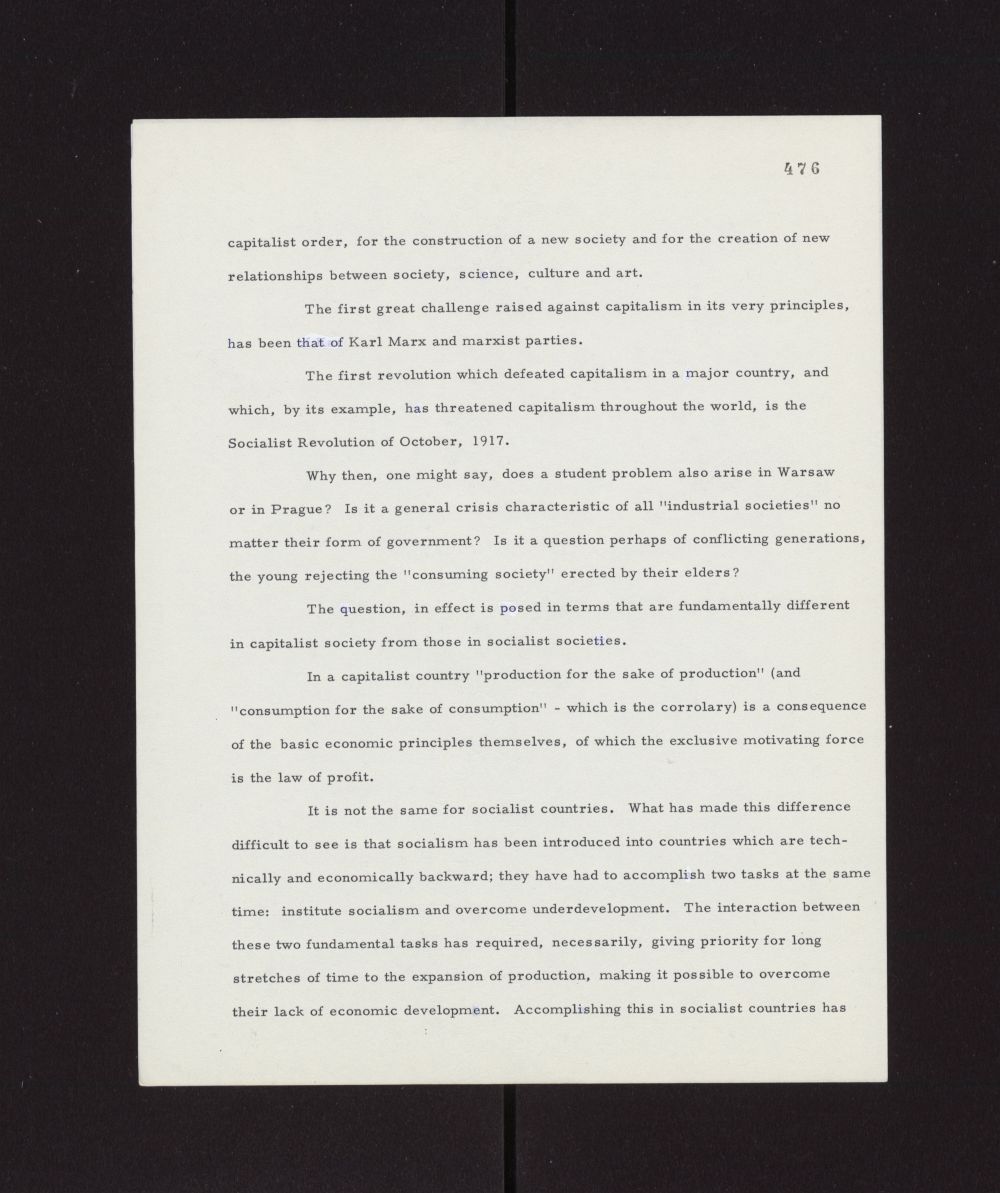

ft
II
II
capitalist order, for the construction of a new society and for the creation of new
relationships between society, science, culture and art.
relationships between society, science, culture and art.
The first great challenge raised against capitalism in its very principles,
has been that of Karl Marx and marxist parties.
has been that of Karl Marx and marxist parties.
The first revolution which defeated capitalism in a major country, and
•which, by its example, has threatened capitalism throughout the "world, is the
Socialist Revolution of October, 1917.
•which, by its example, has threatened capitalism throughout the "world, is the
Socialist Revolution of October, 1917.
Why then, one might say, does a student problem also arise in Warsaw
or in Prague? Is it a general crisis characteristic of all "industrial societies" no
matter their form of government? Is it a question perhaps of conflicting generations,
the young rejecting the "consuming society" erected by their elders?
or in Prague? Is it a general crisis characteristic of all "industrial societies" no
matter their form of government? Is it a question perhaps of conflicting generations,
the young rejecting the "consuming society" erected by their elders?
The question, in effect is posed in terms that are fundamentally different
in capitalist society from those in socialist societies.
in capitalist society from those in socialist societies.
In a capitalist country "production for the sake of production" (and
"consumption for the sake of consumption" - which is the corrolary) is a consequence
of the basic economic principles themselves, of which the exclusive motivating force
is the law of profit.
of the basic economic principles themselves, of which the exclusive motivating force
is the law of profit.
It is not the same for socialist countries. What has made this difference
difficult to see is that socialism has been introduced into countries which are tech-
nically and economically backward; they have had to accomplish two tasks at the same
time: institute socialism and overcome underdevelopment. The interaction between
these two fundamental tasks has required, necessarily, giving priority for long
stretches of time to the expansion of production, making it possible to overcome
their lack, of economic development. Accomplishing this in socialist countries has
difficult to see is that socialism has been introduced into countries which are tech-
nically and economically backward; they have had to accomplish two tasks at the same
time: institute socialism and overcome underdevelopment. The interaction between
these two fundamental tasks has required, necessarily, giving priority for long
stretches of time to the expansion of production, making it possible to overcome
their lack, of economic development. Accomplishing this in socialist countries has
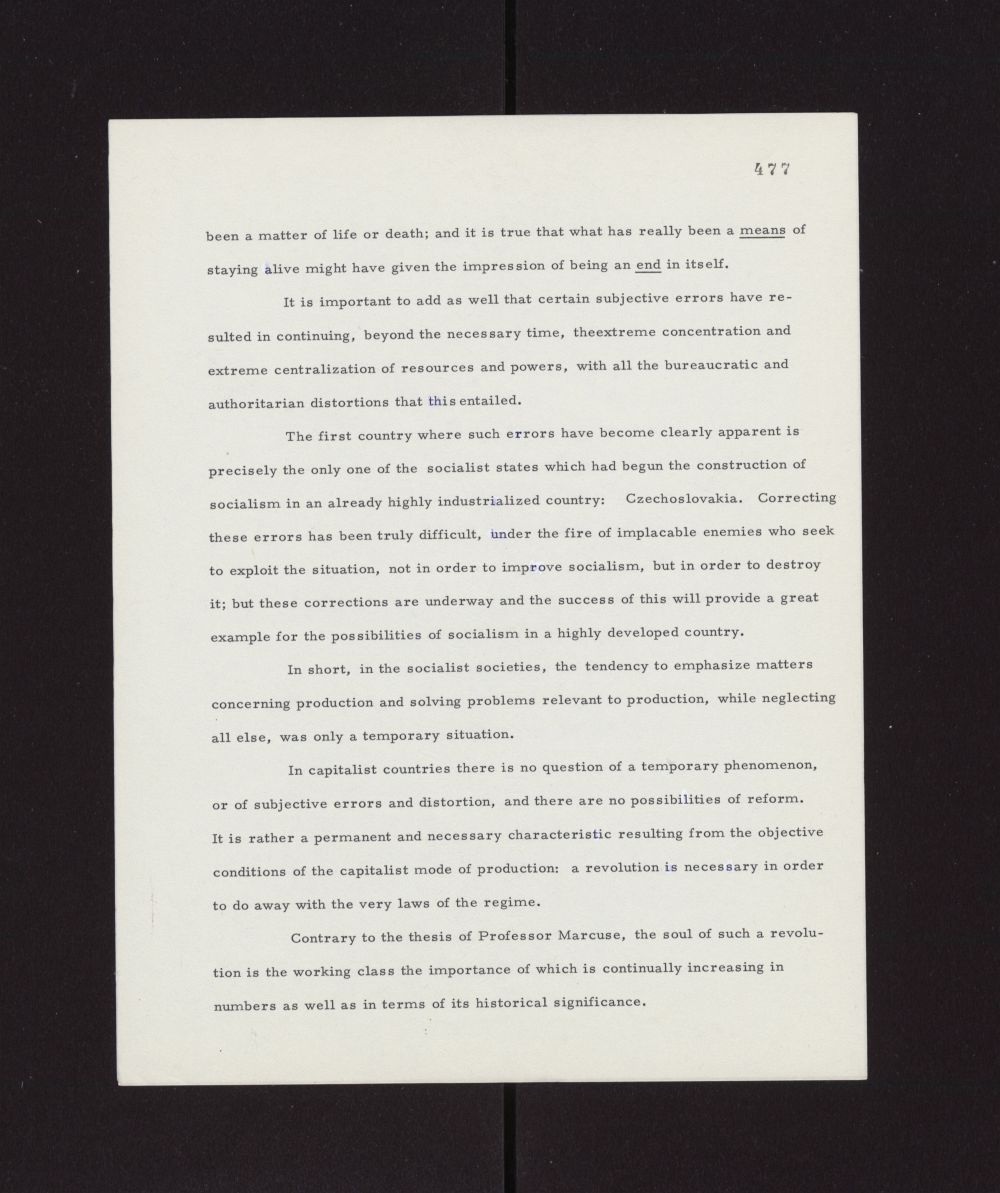

4 7 7
been a matter of life or death; and it is true that -what has really been a means of
staying alive .might have given the impression of being an end in itself.
staying alive .might have given the impression of being an end in itself.
It is important to add as well that certain subjective errors have re-
sulted in continuing, beyond the necessary time, theextreme concentration and
extreme centralization of resources and powers, -with all the bureaucratic and
authoritarian distortions that this entailed.
sulted in continuing, beyond the necessary time, theextreme concentration and
extreme centralization of resources and powers, -with all the bureaucratic and
authoritarian distortions that this entailed.
The first country where such errors have become clearly apparent is
precisely the only one of the socialist states which had begun the construction of
socialism in an already highly industrialized country: Czechoslovakia. Correcting
these errors has been truly difficult, under the fire of implacable enemies who seek
to exploit the situation, not in order to improve socialism, but in order to destroy
it; but these corrections are underway and the success of this will provide a great
example for the possibilities of socialism in a highly developed country.
precisely the only one of the socialist states which had begun the construction of
socialism in an already highly industrialized country: Czechoslovakia. Correcting
these errors has been truly difficult, under the fire of implacable enemies who seek
to exploit the situation, not in order to improve socialism, but in order to destroy
it; but these corrections are underway and the success of this will provide a great
example for the possibilities of socialism in a highly developed country.
In short, in the socialist societies, the tendency to emphasize matters
concerning production and solving problems relevant to production, 'while neglecting
all else, was only a temporary situation.
concerning production and solving problems relevant to production, 'while neglecting
all else, was only a temporary situation.
In capitalist countries there is no question of a temporary phenomenon,
or of subjective errors and distortion, and there are no possibilities of reform.
It Is rather a permanent and necessary characteristic resulting from the objective
conditions of the capitalist mode of production; a revolution Is necessary in order
to do away with the very laws of the regime.
or of subjective errors and distortion, and there are no possibilities of reform.
It Is rather a permanent and necessary characteristic resulting from the objective
conditions of the capitalist mode of production; a revolution Is necessary in order
to do away with the very laws of the regime.
Contrary to the thesis of Professor Marcuse, the soul of such a revolu-
tion Is the working class the Importance of which is continually increasing in
numbers as well as in terms of its historical significance.
tion Is the working class the Importance of which is continually increasing in
numbers as well as in terms of its historical significance.
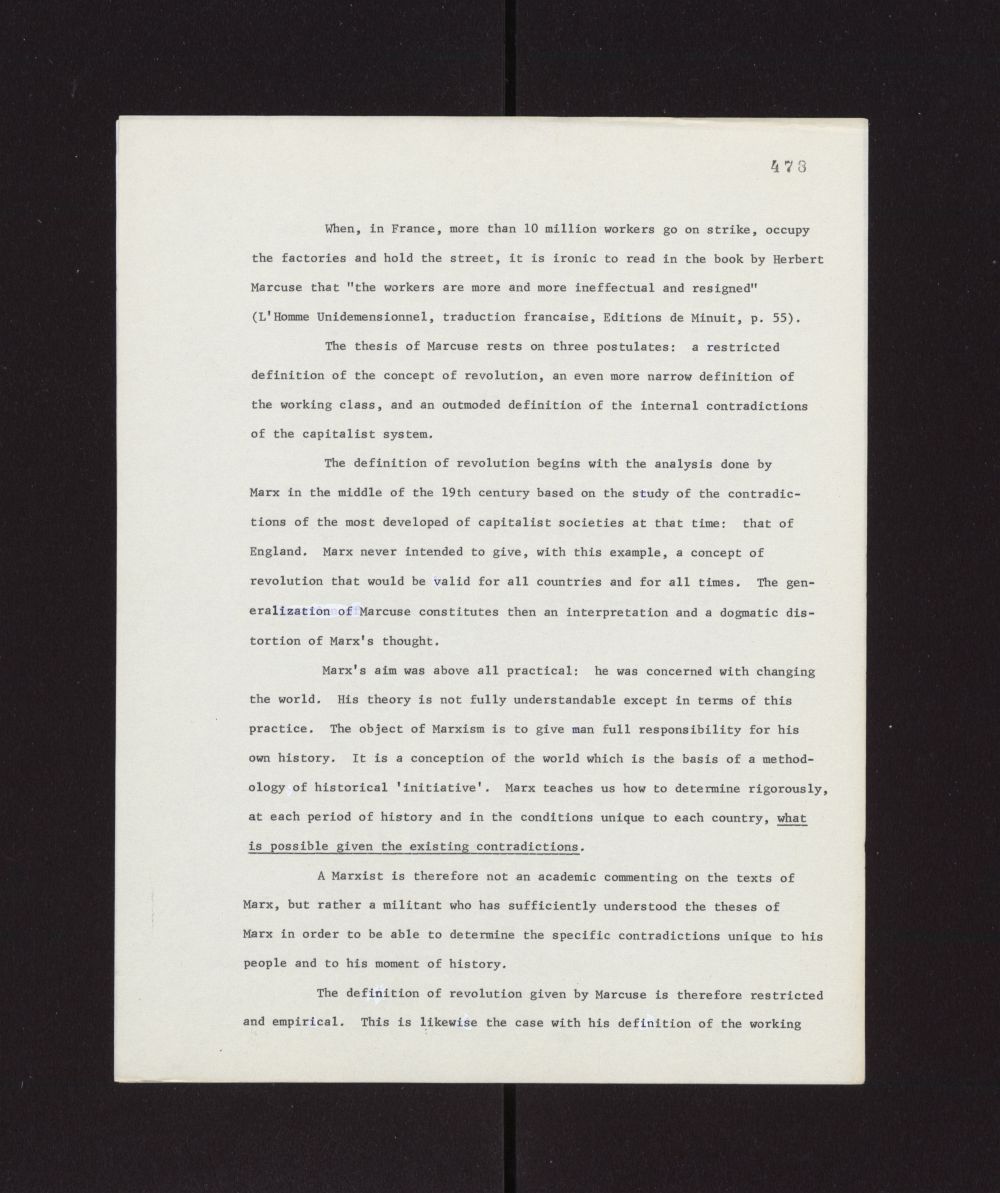

IV '".}
i u
When, in France, more than 10 million workers go on strike, occupy
the factories and hold the street, it is ironic to read In the book by Herbert
Marcuse that "the workers are more and more ineffectual and resigned"
(L'ltomme Unidemensionnel, traduction francaise, Editions de Minuit, p. 55).
the factories and hold the street, it is ironic to read In the book by Herbert
Marcuse that "the workers are more and more ineffectual and resigned"
(L'ltomme Unidemensionnel, traduction francaise, Editions de Minuit, p. 55).
The thesis of Marcuse rests on three postulates: a restricted
definition of the concept of revolution, an even more narrow definition o£
the working class, and an outmoded definition of the internal contradictions
of the capitalist system,
definition of the concept of revolution, an even more narrow definition o£
the working class, and an outmoded definition of the internal contradictions
of the capitalist system,
The definition of revolution begins with the analysis done by
Marx In the middle of the 19th century based on the study of the contradic-
tions of the most developed of capitalist societies at that time: that of
England, Marx never intended to give, with this example, a concept of
revolution that would be valid for all countries and for all times. The gen-
eralization of Marcuse constitutes then an Interpretation and a dogmatic dis-
tortion of Marx's thought,
Marx In the middle of the 19th century based on the study of the contradic-
tions of the most developed of capitalist societies at that time: that of
England, Marx never intended to give, with this example, a concept of
revolution that would be valid for all countries and for all times. The gen-
eralization of Marcuse constitutes then an Interpretation and a dogmatic dis-
tortion of Marx's thought,
Marx's aim was above all practical: he was concerned with changing
the world. His theory is not fully understandable except in terms of this
practice. The object of Marxism is to give man full responsibility for his
own history. It is a conception of the world which Is the basis of a method-
ology of historical 'Initiative*. Marx teaches us how to determine rigorously,
at each period of history and in the conditions unique to each country, what
the world. His theory is not fully understandable except in terms of this
practice. The object of Marxism is to give man full responsibility for his
own history. It is a conception of the world which Is the basis of a method-
ology of historical 'Initiative*. Marx teaches us how to determine rigorously,
at each period of history and in the conditions unique to each country, what
A Marxist is therefore not an academic commenting on the texts of
Marx, but rather a militant who has sufficiently understood the theses of
Marx In order to be able to determine the specific contradictions unique to his
people and to his moment of history,
Marx, but rather a militant who has sufficiently understood the theses of
Marx In order to be able to determine the specific contradictions unique to his
people and to his moment of history,
The definition of revolution given by Marcuse Is therefore restricted
and empirical. This Is likewise the case with his definition of the working
and empirical. This Is likewise the case with his definition of the working
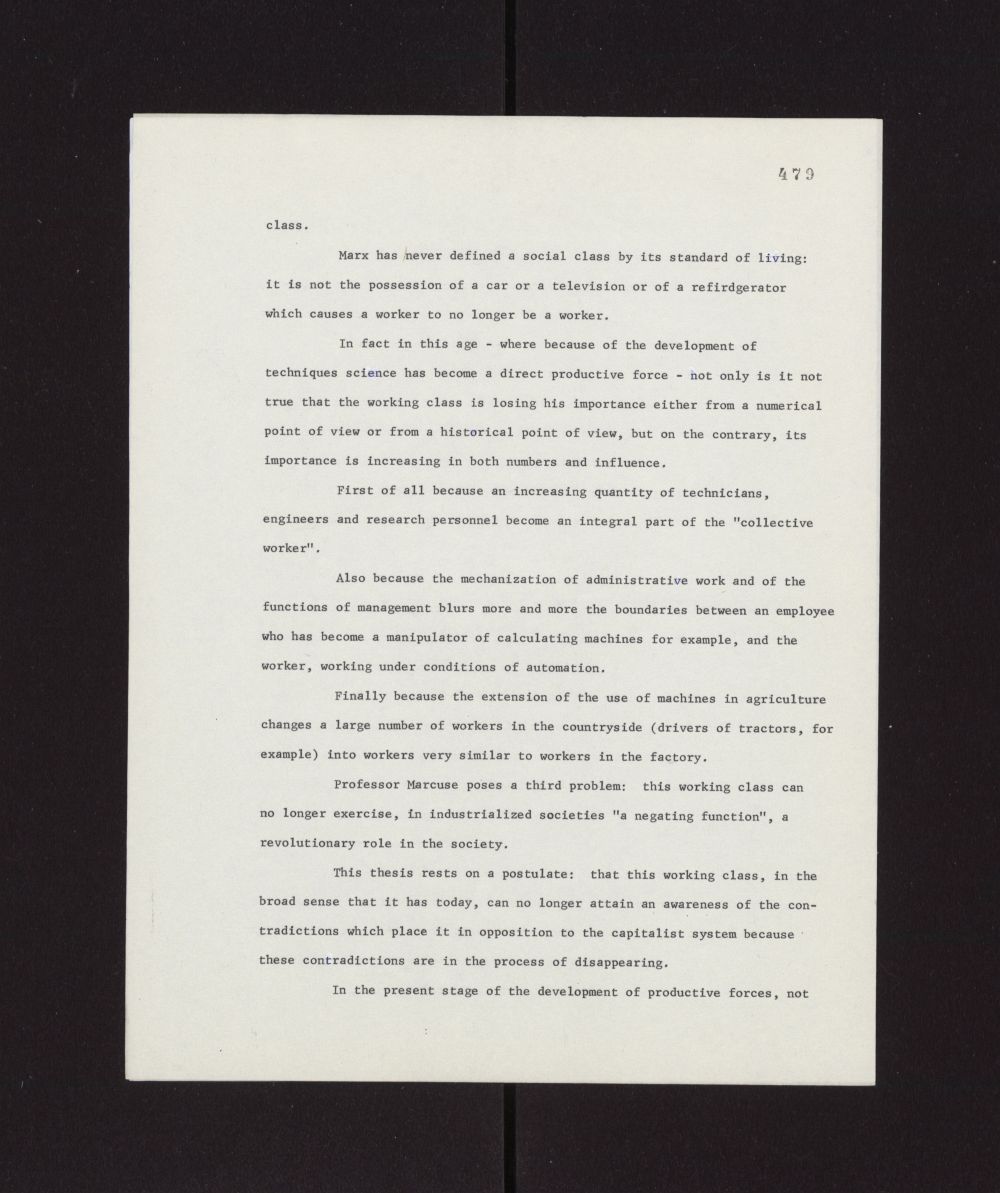

473
class,
Marx has -never defined a social class by its standard of living:
it is not the possession of a car or a television or of a refirdgerator
which causes a worker to no longer be a worker.
it is not the possession of a car or a television or of a refirdgerator
which causes a worker to no longer be a worker.
In fact in this age - where because of the development of
techniques science has become a direct productive force - not only is it not
true that the working class is losing his importance either from a numerical
point of view or from a historical point of view, but on the contrary, its
importance is increasing in both numbers and influence.
true that the working class is losing his importance either from a numerical
point of view or from a historical point of view, but on the contrary, its
importance is increasing in both numbers and influence.
First of all because an increasing quantity of technicians,
engineers and research personnel become an integral part of the "collective
worker",
engineers and research personnel become an integral part of the "collective
worker",
Also because the mechanization of administrative work and of the
functions of management blurs more and more the boundaries between an employee
who has become a manipulator of calculating machines for example, and the
worker, working under conditions of automation.
functions of management blurs more and more the boundaries between an employee
who has become a manipulator of calculating machines for example, and the
worker, working under conditions of automation.
Finally because the extension of the use of machines in agriculture
a large number of workers in the countryside (drivers of tractors, for
example) into workers very similar to workers in the factory.
a large number of workers in the countryside (drivers of tractors, for
example) into workers very similar to workers in the factory.
Professor Marcuse poses a third problem: this working class can
no longer exercise, in industrialized societies "a negating function", a
revolutionary role in the society,
no longer exercise, in industrialized societies "a negating function", a
revolutionary role in the society,
This thesis rests on a postulate: that this working class, in the
broad sense that it has today, can no longer attain an awareness of the con-
tradictions which place it in opposition to the capitalist system because •
these contradictions are in the process of disappearing,
broad sense that it has today, can no longer attain an awareness of the con-
tradictions which place it in opposition to the capitalist system because •
these contradictions are in the process of disappearing,
In the present stage of the development of productive forces, not
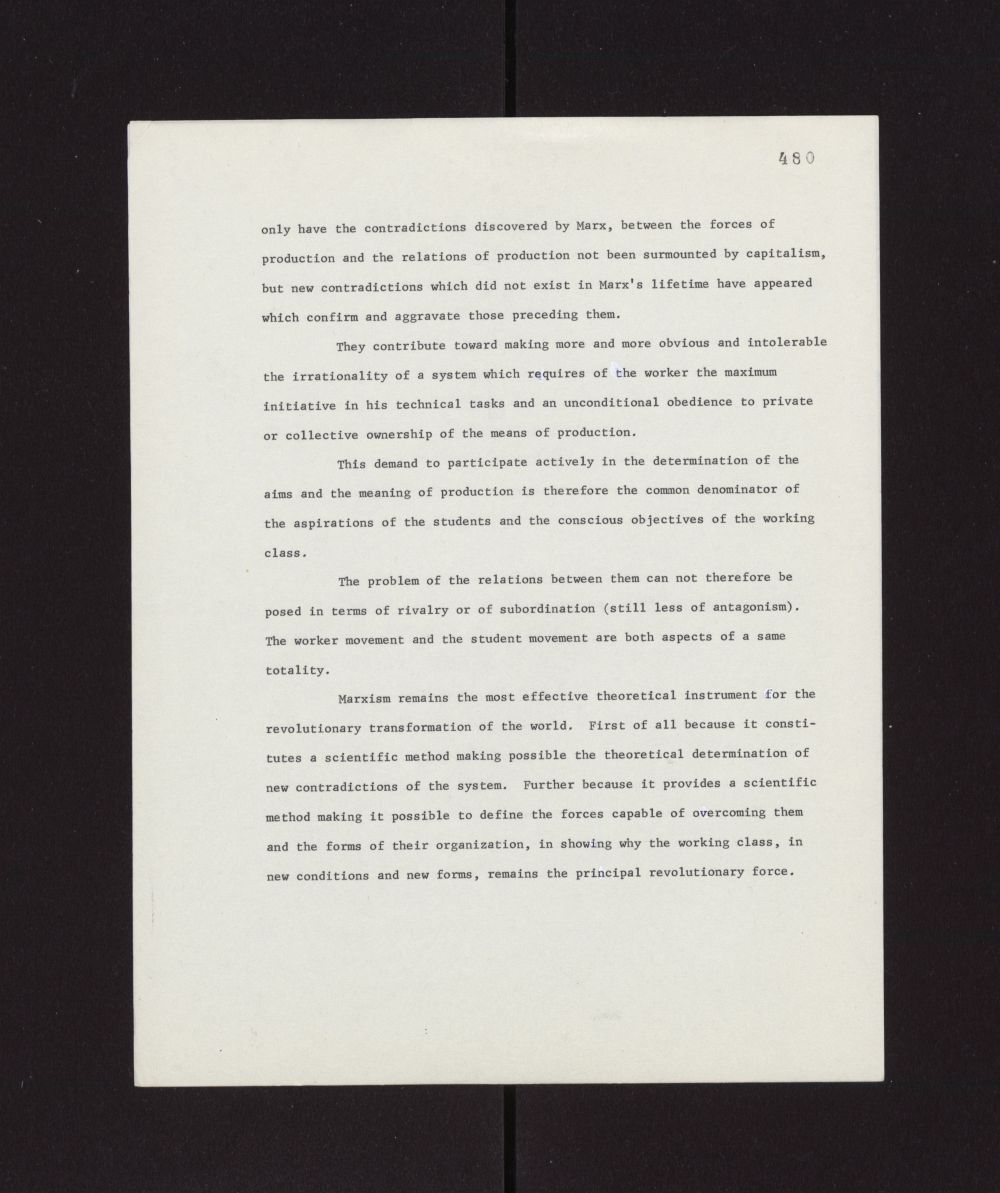

80
only have the contradictions discovered by Marx, between the forces of
production and the relations of production not been surmounted by capitalism,
but new contradictions which did not exist in Marx's lifetime have appeared
which confirm and aggravate those preceding them,
production and the relations of production not been surmounted by capitalism,
but new contradictions which did not exist in Marx's lifetime have appeared
which confirm and aggravate those preceding them,
They contribute toward making more and more obvious and Intolerable
the Irrationality of a system which requires of the worker the maximum
Initiative In his technical tasks and an unconditional obedience to private
or collective ownership of the means of production.
the Irrationality of a system which requires of the worker the maximum
Initiative In his technical tasks and an unconditional obedience to private
or collective ownership of the means of production.
This demand to participate actively in the determination of
aims and the meaning of production is therefore the common denominator of
the aspirations of the students and the conscious objectives of the working
class.
aims and the meaning of production is therefore the common denominator of
the aspirations of the students and the conscious objectives of the working
class.
The problem of the relations between them can not therefore be
posed In terms of rivalry or of subordination (still less of antagonism).
The worker movement and the student movement are both aspects of a same
totality,
posed In terms of rivalry or of subordination (still less of antagonism).
The worker movement and the student movement are both aspects of a same
totality,
Marxism remains the most effective theoretical Instrument for the
revolutionary transformation of the world. First of all because It consti-
tutes a scientific method making possible the theoretical determination of
new contradictions of the system. Further because It provides a scientific
method making it possible to define the forces capable of overcoming them
and the forms of their organization, In showing why the working class, in
new conditions and new forms, remains the principal revolutionary force.
revolutionary transformation of the world. First of all because It consti-
tutes a scientific method making possible the theoretical determination of
new contradictions of the system. Further because It provides a scientific
method making it possible to define the forces capable of overcoming them
and the forms of their organization, In showing why the working class, in
new conditions and new forms, remains the principal revolutionary force.
Category
Title
An Unsolved Theoretical Problem
Date
Unknown
Keywords